
The Project Gutenberg EBook of My Short Story Book, by Various This eBook is for the use of anyone anywhere in the United States and most other parts of the world at no cost and with almost no restrictions whatsoever. You may copy it, give it away or re-use it under the terms of the Project Gutenberg License included with this eBook or online at www.gutenberg.org. If you are not located in the United States, you'll have to check the laws of the country where you are located before using this ebook. Title: My Short Story Book Author: Various Release Date: December 5, 2015 [EBook #50613] Language: English Character set encoding: UTF-8 *** START OF THIS PROJECT GUTENBERG EBOOK MY SHORT STORY BOOK *** Produced by Juliet Sutherland, Emmy and the Online Distributed Proofreading Team at http://www.pgdp.net

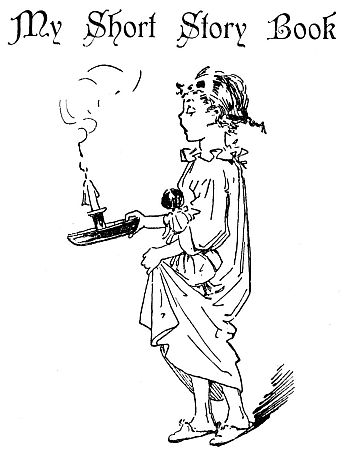
Uniform in Price and Style
MY BIBLE STORY BOOK
MY SHORT STORY BOOK
MY WILD ANIMAL BOOK
MY FARMYARD STORY BOOK
MY NURSERY RHYME BOOK
MY NURSERY TALE BOOK


by
Ernest · Nister · London ·
E · P · Dutton & C^{o.} New York ·
No. 3233.
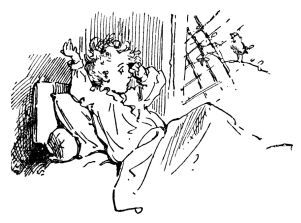
| PAGE | ||
| The Snow Witch | Louisa Molesworth | 7 |
| The Christmas-tree Punch | L. L. Weedon | 12 |
| The Grateful Pedlar | E. Nesbit | 16 |
| The Little Lost Doll | M. A. Hoyer | 20 |
| The Uninvited Guest | Emily Bennett | 24 |
| The Winged Flower | E. Dyke | 28 |
| The Stuck-up Rabbit | E. Nesbit | 30 |
| April Showers | L. L. Weedon | 32 |
| The Story of Tommy | Constance Milman | 35 |
| The New Ship | L. L. Weedon | 40 |
| The Happy Lily | E. Nesbit | 44 |
| Contented Charlie | L. L. Weedon | 47 |
| Our Cat’s Tale | E. Nesbit | 50 |
| Doing Nothing | E. Nesbit | 52 |
| Greedy Toddles | L. L. Weedon | 57 |
| The Sandman | Sheila | 60 |
| Dodo’s Kitten | L. L. Weedon | 64 |
| The Three Wishes | E. Nesbit | 68 |
| The Fashionable Fur | E. Nesbit | 71 |
| Nell’s Secret | L. L. Weedon | 77 |
| Hide and Seek | E. Nesbit | 81 |
| Twelfth Night Fairy | L. L. Weedon | 85 |
| The Pen Fairy | E. Nesbit | 89 |
| The Little Dancing Girl | L. L. Weedon | 92 |
| Dolly’s Voyage | L. L. Weedon | 96 |
| The Love Match | E. Nesbit | 99 |
| The Little Green Man | E. Dyke | 101 |
| The Rubber Fairy | E. Nesbit | 104 |
| The Proud Gilt Button | L. L. Weedon | 106 |
| The Grateful Fairy | E. Nesbit | 110 |
| The Bunch of Violets | E. Dyke | 114 |
| The Pink Egg | E. Nesbit | 117 |
| Our Black Cat | E. Nesbit | 120 |
| The Mirror of Truth | E. Nesbit | 123 |
| The Little Boy Next Door | E. Nesbit | 127 |
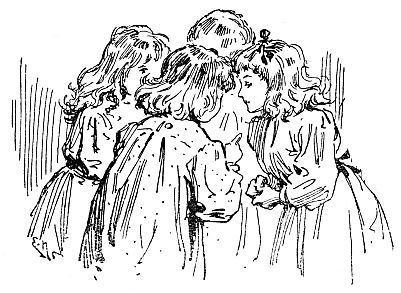

THERE was skating on the ponds where the snow had been cleared; there were icicles on the trees, nice blue, clear skies in the daytime, cold, bright, wintry moonlight at night.
Lovely weather for Christmas holidays! But to one little five-year-old man, nothing had seemed lovely this Christmas, though he was spending it with his Father and Mother and his big sisters at Grandpapa’s beautiful old country-house, where everybody did all that could be done to make Grandpapa’s guests happy.
For poor little Roger was pining for his elder brother, Lawson, whom he had not seen for more than four months. Lawson was eight, and had been at school since Michaelmas, and there he had caught a fever which had made it not safe for him[8] to join the rest of the family till the middle of January. But he was coming to-morrow.
Why, then, did Roger still look sad and gloomy?
“Stupid little boy,” said Mabel. “I’m sure we’ve tried to amuse him. Why, Mamma let him sit up an hour later than usual last night, to hear all those funny old fairy tales and legends Uncle Bob was telling.”
“Yes, and weren’t they fun?” answered Pansy. “I did shiver at the witch ones, though, didn’t you?”
Poor little Roger! Pansy’s shivering was nothing to his! They had all walked home from the Vicarage, tempted by the clear frosty moonlight, and the hard, dry ground; and trotting along, a little behind the others, a strange thing had happened to the boy. Fancy—in the field by the Primrose Lane, through the gateway, right in a bright band of moonlight, he had seen a witch! Just such a witch as Uncle Bob had described—with shadowy garments, and outstretched arms, and a queer-shaped head, on all of which the icicles were sparkling, just as Uncle Bob had said. For it was[9] a winter-witch he had told the story about, whose dwelling was up in the frozen northern seas; “the Snow Witch” they called her.
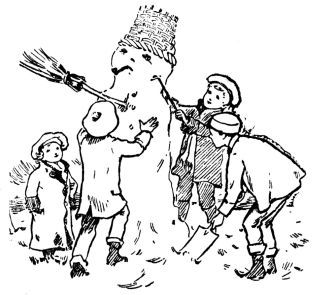
Cold as it was, Roger was in a bath of heat, his heart beating wildly, his legs shaking, when he overtook his sisters. And the night that followed was full of terrible dreams and starts, and misery, even though nurse and Baby were next door, and he could see the nightlight through the chinks.
If it had not been that Lawson was coming—Lawson, who never laughed at him or called him “stupid little goose”; Lawson, who listened to all his griefs—Roger could[10] not have borne it. For, strange to say, the little fellow told no one of his trouble; he felt as if he could only tell Lawson.
No wonder he looked pale and sad and spiritless; there was still another dreadful night to get through before Lawson came.
But things sometimes turn out better than our fears. Late that afternoon, when nursery tea was over and bed-time not far off, there came the sound of wheels and then a joyful hubbub. Lawson had come! Uncle Bob had been passing near the school where he was, and had gone a little out of his way to pick him up. Everyone was delighted—though of them all, none so thankful as Roger.
“Though I won’t tell him to-night,” decided the unselfish little fellow, “not to spoil his first night. I shan’t mind when I know he’s in his cot beside me.” And even when Lawson asked him if anything were the matter, he kept to his resolution.
But he awoke in the middle of the night from a terrible dream; Lawson awoke too, and then—out it all came. “I thought she was coming in at the window,” Roger ended. “If—if you look out—it’s moonlight—I[11] think p’r’aps you’ll see where she stands. But no, no; don’t—don’t; she might see you.”
So Lawson agreed to wait till to-morrow. “You go to sleep,” he said. “I’m here, and you can say your prayers again if you like.”
Lawson was up very early next morning. When breakfast was over he told Roger to come out with him. Down the Primrose Lane they went, in spite of Roger’s trembling.
“Now, shut your eyes,” said Lawson, when they got to the gate. He opened it, and led his brother through.
“Look, now!” he said, with a merry laugh. And what do you think Roger saw?
An old scarecrow, forgotten since last year. There she stood, the “Snow Witch”—an apron and ragged shawl, two sticks for arms, a bit of Grandpapa’s hat to crown all—that was the witch!
“Shake hands with her, Roger,” said Lawson. And shake hands they both did, till the old scarecrow tumbled to pieces, never more to frighten either birds or little boys. “Dear Lawson,” said Roger lovingly, as he held up his little face for a kiss. And happy, indeed, were the rest of the Christmas holidays.
L. Molesworth.
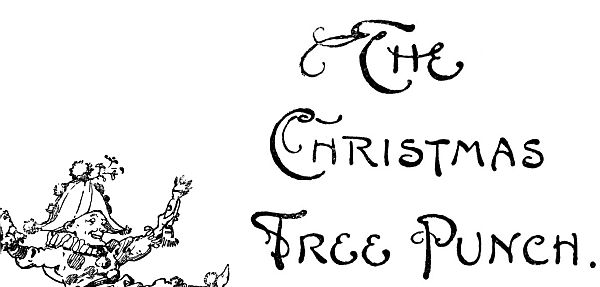
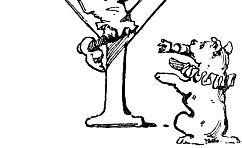
“YOU mustn’t go into the dining-room, children,” said Mother, popping her head in at the school-room door.
“All right, Mother!” Jack and Dorothy and Eva called after her, but Jim didn’t say anything.
He was the naughty boy of the family, and went by the name of “Jim the Terrible,” and I am afraid he very often deserved his name.
When the others went to say good night to Mother, Jim paused outside the dining-room door; it was open just the least little bit in the world, and he peeped in and saw a wonderful tree, standing in the middle of the room, laden with toys.[13]
Right at the top hung a Punch doll, dressed in satin and tinsel, and he shone and glittered so that Jim could see him better than the other toys.
But his Mother called to him, so he could not wait to examine the tree more closely.
When the children were in bed Jim made up his mind to lie awake, and as soon as the others were asleep, he stole softly downstairs to have another look at the Christmas-tree.
The room was a blaze of light now, and the Punch doll at the top shook his staff at Jim as soon as he entered.
“Oh! you naughty boy,” he cried. “You Terrible Jim. What do you mean by coming here when your Mother told you not to go near the dining-room! I’ll teach you to disobey! Oh—o—o—o—! Go to bed! go to bed!”
All the while Punch was speaking he was growing larger and larger, until at last he seemed as big as the giant in the pantomime, and then he gave a terrific jump from the top of the tree, and began to chase Jim upstairs.[14]
Oh! how the little boy ran, with Punch close behind him all the time.
At length he reached the nursery, and with a bound sprang into his bed and tucked the clothes up round him. There he lay trembling for ever such a time, but when at length he ventured to peep out, the nursery was quite dark, and Punch had evidently gone away, so he curled himself up and went to sleep.
The next day when the children were called in to the forbidden room, they simply danced and screamed with delight when they saw the beautiful Christmas-tree.
At least all except Jim, for when he looked at the Punch doll on the top of the tree, it seemed to him that it was frowning at him, and he made up his mind never to peep through cracks of doors again, when it was forbidden him, however much he might want to know what was behind them.
Now, before he had made this good resolution he had been thoroughly miserable.
He could take no pleasure at all in the beautiful presents which Mother gathered for them from the Christmas-tree, for all[15] the time he was watching the Punch doll to see if he would come down from his perch and chase him upstairs again.
No sooner did he resolve to be a better boy in future than the expression on Punch’s face changed in a most surprising manner: he seemed almost to smile at Jimmy.
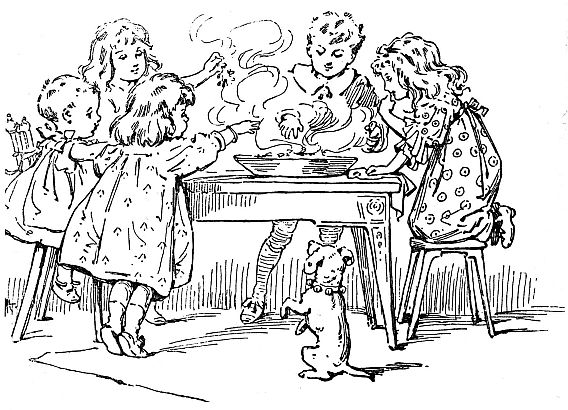
Even when the tree was stripped of everything except Punch, and the children were busy pulling the plums out of the big[16] snapdragon Father had lighted, Jimmy fancied the old fellow nodded his head at him once or twice in a friendly fashion, and the little boy was so relieved and happy that he clapped his hands for joy, and shouted with the rest.
L. L. Weedon.

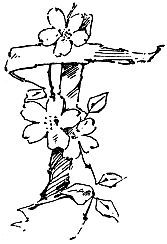
THERE was once a poor old pedlar who sold ribbons and brooches and tapes and needles; his hair was long and his back was bent, and perhaps he did look rather strange; but that was no reason why the boys should have called him names and thrown stones at him as he went through the village. At last a stone hit him on the forehead and he fell on the dusty road, and the bad boys ran away, afraid of what they had done. But one boy named Jack had seen the thing from a field some way off, and now he[17] came running up, and bathed the poor old man’s head and spoke kindly to him, and when the pedlar was better he said: “You are a good boy and you may have what you like out of my pack.”
Now, Jack did not like to take anything valuable out of a poor man’s pack, so he looked at all the pretty things, and then he picked out an old knife.
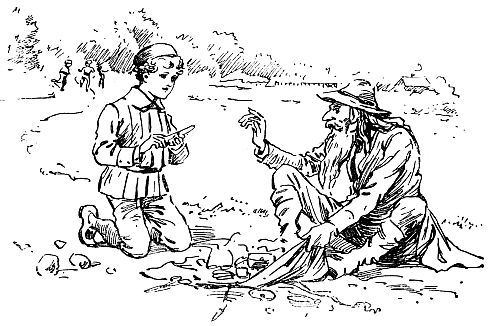
The pedlar laughed. “You have chosen the most valuable thing I have,” he said; “that knife will cut through iron or stone as easily as through butter.”
“Oh! then,” said Jack hastily, “let me have these old spectacles.”[18]
The pedlar laughed louder than ever.
“Those spectacles will make you see to any part of the world, and see through stone or iron as easily as through glass,” he said; “there—take both!”
And putting the two into Jack’s hand he vanished—and he did it quite easily, because he was a magician.
So now Jack’s fortune was made; he could see where gold and precious stones lay under the earth and he could cut away the rocks that covered them as though they were butter.
So he was rewarded for his kind-heartedness.
But the greatest reward of all came to him when the Princess of that land was carried off and hidden by an enchanter. And the King, after vainly offering all sorts of other prizes, at last said that any man who could find the Princess and set her free should marry her.
So Jack put on his spectacles and saw the Princess sitting crying in a lonely tower. It was a year’s journey off, but he made the journey, and wherever he was, he put on his spectacles again and looked at the[19] beautiful Princess, and that gave him courage.
At last he came to the tower, and with his magic knife he cut through the iron door and set the Princess free, and with the same knife he killed the wicked enchanter.
Then he took the Princess home in triumph and the grateful pedlar came to the wedding-feast.
E. Nesbit.
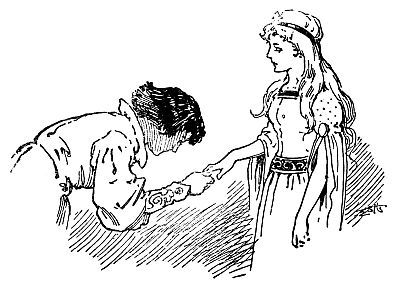

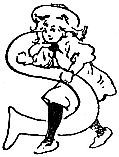
SHE was lost as they went through the wood. How it happened nobody quite knew, but they supposed she must have tumbled out of the perambulator as Kitty pushed it through the ferns and long grasses, and so poor Dolly was left there, lying on her back, staring up at as much sky as was visible through the fern-fronds, and the foxglove leaves, and the branches of the trees overhead.
Would they come back for her? The children’s voices and footsteps grew fainter and fainter, till at last they died quite away in the distance, and the robin began singing again on the branch over her head. Presently the little bird caught sight of Dolly, and flew down and looked at her with his bright eyes, and then a tiny [21]field-mouse ran round and over her with her little light paws—which must have tickled, but still Dolly never moved, and a wise old beetle came out of his hole, and twiddled his long whiskers as he peered at her curiously.
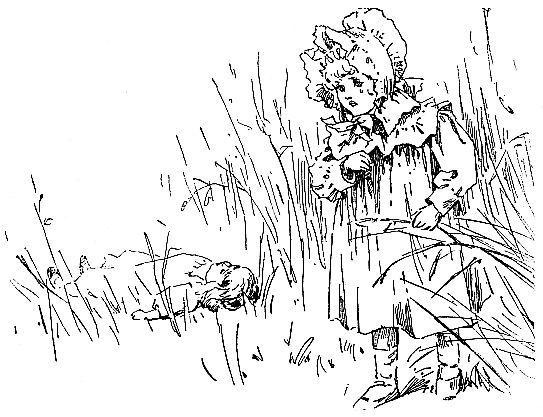
“Sweet! sweet!” said the robin. “Who is she?”
“Twee! twee!” whispered the mouse. “I don’t know!”
“Hum, hu-um!” buzzed the beetle. “Why doesn’t she speak?”[22]
But Dolly didn’t say a word!
Now, eventide came, and the sun grew tired, and put himself to bed under a crimson-and-gold counterpane. The robin found a comfortable twig on which to perch, and tucked his head under his wing. The mouse went home to her babies, of whom she had six—all packed warm and tight in a neat little nest hung on to a cornstalk in the next field. And the beetle spread his shining wings and went for a fly round before he, too, rolled himself in a roseleaf blanket and went to sleep! But Dolly never closed her eyes!
Then the great stars lit their lamps, and looked down at her through the fern-fronds, but if they said anything no one heard them—they were too far off!
“Dolly, dear Dolly, where are you?” cried a little voice, and little footsteps came pressing through the tall bracken fern.
But Dolly didn’t answer!
“Dolly! Dolly! Oh! I wish I could find my Dolly!” There were tears in the little voice now, and the footsteps were more hurried. Yet Dolly lay still![23]
The sobs grew louder and louder, the little feet almost touched Dolly as she lay hidden under the big foxglove; then the little steps went on, and the sobs grew fainter in the distance, and Dolly lay still staring up at the sky!
So the days went by, and the winter came, and the falling leaves drifted over Dolly, and the snow covered her, but she never moved nor shivered—till one day in spring-time a great wind arose, which blew all the dead dry leaves away in little rustling dances—and lo! John the woodman caught sight of Dolly’s pink cheeks and blue eyes still staring up at the sky!
“Why,” he exclaimed, “I do believe there’s little missie’s doll, as she fretted so at losing!”
And he took Dolly home in his pocket!
M. A. Hoyer.
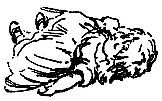

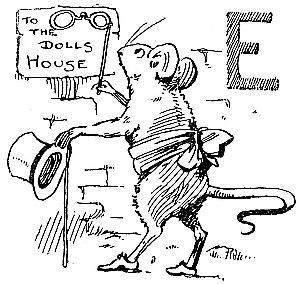
EFFIE was quite in distress about the spare room in her doll’s-house, because she had no “visitor doll.”
All the other rooms were occupied, for there were two smart maids in the kitchen who were beginning to cook the dinner; then in the dining-room there was a “mamma” sitting on the blue sofa, gazing at the bowl of gold-fish. In the nursery, the three children were already put to bed, and the poor, tired nurse rested by the bright coal-scuttle on the floor. In the drawing-room, two gay dolls in ball-dresses sat by the piano; but there was no one for the spare room!
“It seems a great pity,” said Mamma,[25] “because you put all the nicest things in this room, Effie—the wax candles, the pretty box of chocolates, the lace curtains to the bed, and the dumb-bells; we must try and think of someone to come and stay here.”
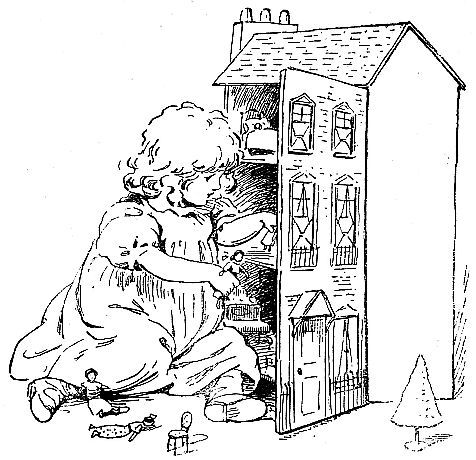
“Mamma, do you think Rosie would lend me one of her dolls?” suggested Effie.
“Supposing you write and ask her,” said Mamma.
Effie seemed to think this a good idea,[26] but then she would have to wait a few days, because her friend was away, staying at a farmhouse.
“Shall we put the china baby in,” said Mamma, “or is he quite one of the family?”
“Oh, Mummy, he’s the youngest child of all!” replied Effie, shaking her head.
“I am afraid he is too much of a baby,” said Mamma, looking into the spare room, “and he might get into the shower-bath or open the door of the bird-cage—perhaps it would be unsafe.”
Effie nodded.
“We will write to Rosie, then,” said Mamma encouragingly.
That night, when Effie was fast asleep, a little grey mouse peeped through a crack in the nursery floor, and seeing that the room was empty, she hurried into every corner to find some chance crumb of cake or bread, but alas for her! the room had been too carefully swept, so the hungry little mouse could find nothing for her supper.
Suddenly, she saw the dolls’-house, so she squeezed through the glass door, which Effie had not quite shut, and very soon found her way into the spare room.[27]
“The very thing!” cried she to herself, whisking her tail with joy. “Here is a nice little bed to sleep in, and a wax candle on the dressing-table for supper! How lucky I am! this is indeed a nice house to visit!”
The next morning, Effie ran to her dolls’-house and gave a little scream. “Mummy, look! there’s been a mouse in the spare room! It’s eaten two of the candles—look!”
“That is not quite the guest you hoped for, is it, Effie?” said Mamma.
“No, but do you think it will come again to-night? Oh! I should like to see it in the morning!” said Effie.
Emily Bennett.
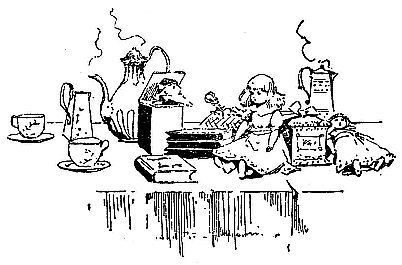

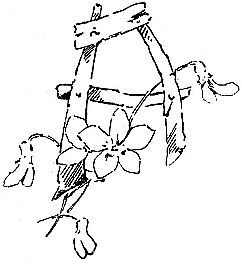
A GAILY-TINTED little flower once lived in the corner of a field. No other flowers grew near, and she often felt sad and lonely. But one day a beautiful butterfly hovered over her head and began to talk to her. Presently he alighted upon one of her leaves, and gazed admiringly into her sweet face. The flower felt very happy, and said: “How good it is of you to stop here and talk to me!”
“I must be going soon,” replied the butterfly. “How I wish that you could fly away with me! You have no idea how delightful it is to flit about in the air!”
“It must indeed be nice!” replied the little flower. “But I cannot fly, for, as you see, I have no wings, and besides, my stalk holds me fast to the ground. So I have[29] to stay always in one place. I must just make the best of it,” added she, trying to be brave, although her heart ached at the thought of parting with her winged friend.
Then a kind little Fairy popped up out of the grass, and said: “I have been listening to your talk. If you, fair flower, would indeed like to fly away with your friend, I will give you a pair of wings like mine.”
Then the Fairy touched the flower with her wand, and she sprang from her stalk, with two gauze-like wings to bear her up. She looked now something like the butterfly, only even more beautiful. The two friends flew away together over the fields, and the Fairy returned to Fairyland, feeling very happy because she had been able to please the little flower.
E. Dyke.
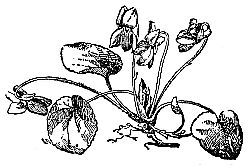
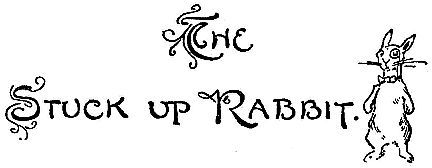
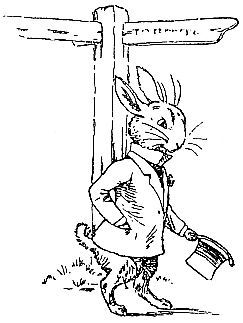
THERE was once a little yellowy-brown rabbit, who was so proud that there was no bearing him. He ran away from home and went to live with some strange rabbits. “I have a right to be proud,” he said, “because my parents are Belgian hares.” But he looked so exactly like the other rabbits that no one believed him, and they turned him out for boasting.
So he went to live in the cucumber-frame, and as the gardener did not notice him he had rather a good time of it. But presently the cucumbers were all over, and then the gardener shut up the frame and went away. And then the bunny grew hungrier and hungrier, and he cried aloud,[31] but no one would help him. “It serves him right for being so proud,” said the other rabbits.
But his mother, who lived quite on the other side of the field, heard him cry, and she came jumping on to the cucumber-frame with such a bounce that she broke the glass and tumbled in. “Come home this minute,” she said. “I’ll teach you to run away from home.”
As she took him past the strange rabbits they all called out: “Hullo, Stuck-up, where are you off to?”
“He’s going home to his father and mother,” said Mrs. Bunny.
“But he said his father and mother were Belgian hares.”
“Belgian fiddlesticks!” said his mother. “I’ll teach him to be ashamed of his family!” So she took him home by the ear. He’s quite a different bunny now, and works hard to support his old father and mother, as all good rabbits should.
E. Nesbit.

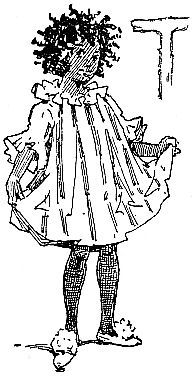
TOMMY was a terrible tease, and poor little Mamie came in for most of the teasing.
Tommy wasn’t really an unkind little boy, but he was very thoughtless, and very often he led Mamie into all sorts of scrapes. One day he persuaded her to play at Indians with him; he screwed up her hair into tight knots, made her shut her eyes and then blacked her face. When the little girl looked in the mirror over the mantelpiece and saw how ugly she was, she ran out of the room, meaning to go to Nurse to be washed clean again; but Tommy ran after her, and, just as she was passing the drawing-room door, he gave her a push, and in she went, right into the middle of[33] a group of ladies who were visiting her Mamma. Oh! how angry Mamma was, for she thought Mamie had done it on purpose.
But what hurt Mamie’s feelings the most was the way in which Tommy treated her dolls. He didn’t like dolls himself, and he couldn’t understand how his sister could love a silly wax thing. But she did. She thought Rosalind was the sweetest and loveliest of babies.
One day Tommy bought a penny squirt. He played for a long time at storms at sea with it, sailing his boat on a big pan of water that stood out in the garden, and squirting at it until it sank.
But he grew tired of this, and then he began to squirt Rosalind, as she lay cuddled up in Mamie’s arms.
Poor Rosalind! Mamie tried hard to protect her, but in vain. “It’s only an April shower,” said Tommy, laughing. “It won’t hurt her.” But dolly was soon wet through, and the last remaining bit of pink on her cheeks came off when Mamie dried her.
The next day Mamie told some of her friends of her troubles, and the little girls put their heads together to think how they[34] could punish Tommy. “I know,” said Elsie Martin. And then there was a great deal of whispering and laughing, after which the little girls parted.
Tommy was going out to tea that afternoon, and as he passed the end of the garden wall, dressed out in his best, a sudden shower of water was squirted all over him, spoiling his nice clean suit.
Tommy looked up in astonishment, for it was not raining; then he heard a great deal of giggling and someone called out: “It’s only an April shower; it won’t hurt you!”
Tommy didn’t say a word, but marched straight home, for he knew he couldn’t go to his tea-party as he was. Mamie met him at the door. “I’m so sorry,” she said, for she had already begun to repent of what she had done. “Won’t you forgive me?”
“Never mind, Mamie,” said Tommy. “It served me right, and I’m sorry I squirted Rosalind, and I’ll never tease you again.”
L. L. Weedon.
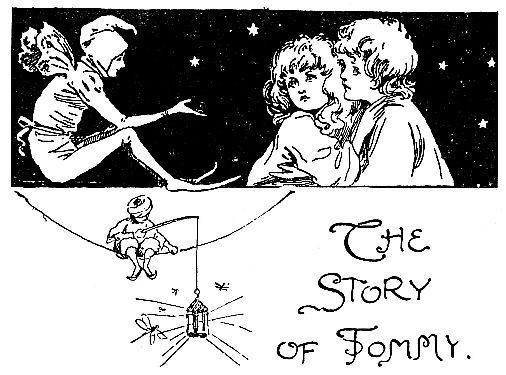
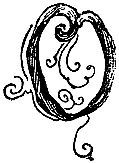
ONCE there was a little boy called Tommy. His Mother sent him one day into the town to buy some needles. On his way home he got tired of carrying them, so when he saw a hay-cart which he knew would pass his Mother’s door he stuck the needles into a bundle of hay. When he got home his Mother said: “Well, Tommy, and where are the needles?”
“Oh! Mother, they will be here directly. I was tired of carrying them, so I stuck[36] them into a hay-cart which is coming this way, and it will soon be here.”
“Oh, you stupid boy, Tommy! you stupid boy! If you were tired of carrying the needles you should have stuck them into your coat.”
“I’ll do better next time, Mother; I’ll do better next time.”
A few days after, his Mother said: “Tommy, will you go into the town and fetch a pound of butter?”
Off went Tommy, bought the pound of butter, and put it all over his coat. When he got home his Mother said: “Well, Tommy, and where’s the butter?”
“I put it all over my coat, but the sun melted it.”
“Oh! you stupid boy, Tommy! You should have put it on a nice white plate and covered it with a piece of white paper.”
“Oh! I’ll do better next time, Mother; I’ll do better next time.”
A few days after, his Mother said: “Tommy, Farmer Jones has given us a little hen. Will you go and fetch it?”
“Oh! yes,” said Tommy. Off he went, fetched the little hen, and put it on a white[37] plate; but before he could put a nice piece of white paper over it, it had flown quite away!
When he got home, his Mother said: “Well, Tommy, and where is the little hen?”
“Oh! Mother, I did what you told me; I put it on a white plate, but before I could cover it with a piece of paper it flew quite away.”
“Oh! you stupid boy, Tommy! You stupid boy! You ought to have put it in a wicker basket and shut down the lid.”
“I’ll do better next time, Mother; I’ll do better next time.”
A few days after, his Mother said: “Tommy, there is a plum pudding for dinner. Go and fetch a pound of brown sugar.”
Off went Tommy, bought the pound of sugar, and put it in a wicker basket, and shut the lid down tight. When he got home his Mother said: “Well, Tommy, and where’s the sugar?”
“Here it is, Mother, here it is.” And he opened the basket, but it was quite empty, for all the sugar had tumbled through the holes in the wicker-work!
“Oh! you stupid boy, Tommy! You[38] should have put the sugar in a paper bag and tied a piece of string very tightly round it.”
“I’ll do better next time, Mother; I’ll do better next time.”
Some time after, his Mother said: “Tommy, Farmer Jones has promised us a dear little puppy dog. Will you go and fetch it?”
“Oh! yes,” said Tommy. So off he went, fetched the little puppy dog, put it in a paper bag, and tied a piece of string very tightly round its neck. When he got home and opened the bag, the poor little puppy was quite dead.
“Oh! you stupid boy, Tommy! You stupid boy! You should have tied a string quite loosely round the little dog’s neck, and let it run after you, and you should have called, 'Hi, little dog!’”
“I’ll do better next time, Mother,” said Tommy, crying.
A long time after, his Mother said: “Tommy, will you go into the town and fetch a leg of mutton? Now, mind you bring it home very carefully.”
“Oh! yes,” said Tommy. So off he[39] went, bought a leg of mutton, tied a piece of string round it, and dragged it after him on the ground, and said: “Hi, little dog! Ho, little dog!” and all the little dogs in the town came after him and ate the mutton, and when he got home there was nothing left but the bone!
When his Mother saw it, she said: “Really, Tommy, you are too stupid; you really are quite a goose.”
A little while after, Tommy was nowhere to be found. His Mother hunted everywhere for him; she cried “Tommy!” here and “Tommy!” there, but she could not find him. As she was coming through the yard and crying and calling, “Tommy! where’s my boy Tommy?” she heard a little voice that seemed to come from the poultry-house: “Here I am, Mother; here I am!”
She opened the door, and there was Tommy sitting on the goose’s nest. She asked him what he was doing, and he said: “Oh! Mother, you said I was quite a goose, so I thought I had better come and sit on the goose’s nest, and I’ve broken all the eggs!”
Wasn’t he a silly boy?
Constance Milman.

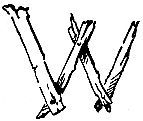
“WHERE are you off to, children?” said Mother. She was just stepping into the carriage to pay a round of visits when Geoffrey and his sister came running out of the house in a state of breathless excitement.
“We’re going down to the river to sail my ship, Mother,” said Geoffrey. “I’ll look after Rosie and see that she comes to no harm.”
“My dear boy, I couldn’t think of letting you go by yourselves,” said Mother. “Father will be home to-morrow, and then he will take you,” she added, as she saw the children’s eager faces begin to cloud over. Then she kissed them both, got into the carriage, and drove away.
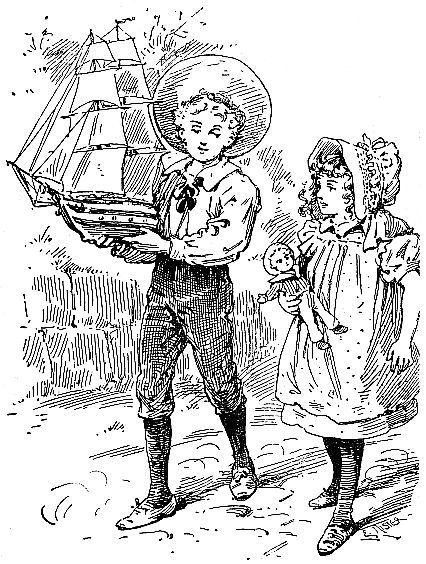
“It’s a jolly shame!” said Geoffrey
crossly. “As if we should come to any
harm! Why, I’m as well able to take care[41]
[42]
of you as Father. Of course I shouldn’t
let you fall in.”
“Well, it’s no use,” sighed Rosie; “we can’t go, so we may as well think of something else to do.”
A rebellious frown gathered on Geoffrey’s face. “I’m going to the river,” he said; “I shall only stay a few minutes to see how the 'Dancing Polly’ sails. Mother will never know!”
Rosie hesitated a minute, but when she saw Geoffrey running down the drive without her, it was too much, and off she went after him.
For a whole hour the children spent a most delightful time sailing the “Dancing Polly,” but alas! the crew, which consisted of a wooden doll, fell overboard, and in stretching over to rescue it Rosie lost her balance and toppled into the river.
Geoffrey shrieked for help. “Rosie’s drowning! Rosie’s drowning!” he cried, and in a moment someone came dashing down the bank, there was a plunge, a moment of dreadful suspense, and then Rosie was lying on the grass with Father standing over her. Yes, it was Father, who was[43] a captain in the Royal Navy, and who had come home from sea a whole day before he was expected.
“However did your Mother come to let you two mites go off to the river by yourselves?” said Father on their way home.
Geoffrey hung his head for a moment, and then, like a brave little man, he told his Father all the truth.
“Ah! Geoff, my boy,” said his Father, “you’ll never make a sailor if you can’t obey orders!”
And what did Mother say?
Why, not one angry word, for no sooner did Geoffrey see her than he burst into tears, and Mother put her loving arms round him and whispered: “My darling, I know you won’t disobey me again!”
And Geoffrey never did.
L. L. Weedon.
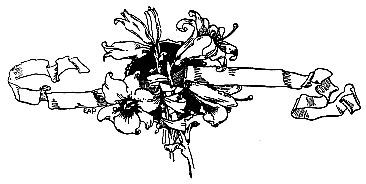
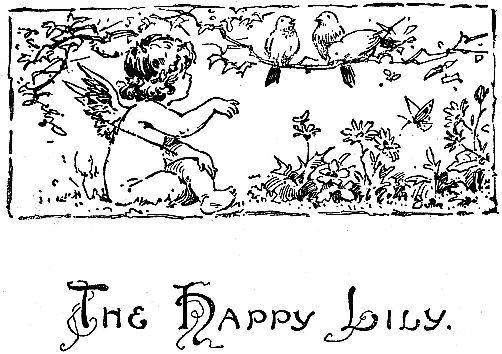
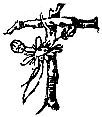
THERE was once a beautiful white Lily who lived in a green garden, and had all the happiness of sun and dew that can come into a flower’s life. Only one thing saddened her; now and then the gardener would come and gather some of her sisters: he took them away, and she never saw them again. One dreadful day the gardener came with a sharp knife and cut the Lily’s stalk and carried her away in his hand. As she went she shed bitter tears, and the gardener said: “What a lot of dew there is in this Lily!”
When she was brought to the house[45] she was placed in a tall green vase and set by the bedside of a little sick child. When the child saw her beauty his tired eyes lighted up with pleasure, and he cried: “Oh, the dear Lily! Mother, when can I go out to see the other lilies growing?” And from that moment he began to get better.
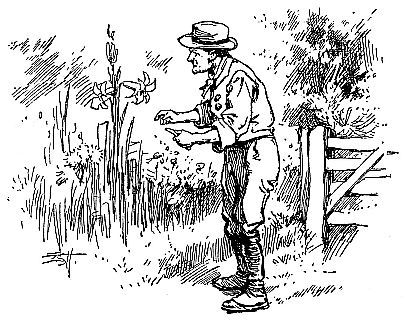
“It was the Lily did it,” said his Mother, with tears of happiness. “He was so tired that if the Lily had not come to cheer him, he might have gone to sleep and never wakened here again.”
The Lily tried hard not to fade. She held herself up bravely, and day by day the sick child looked at the Lily and grew[46] stronger and stronger. And at last a day came when he was well enough to be taken into the garden to see the lilies growing, and when he was gone the Lily drooped and drooped, for she felt that the end of her pretty green and white life was near. But though she was sad, she was not sorry, for she felt that she had done some good with her life. And as she drooped there a white butterfly came fluttering in. “Oh, happy Lily!” he cried. And she looked sadly at him. “I am not sorry—only sad,” she said.
“Sad,” he said; “do not you know what happens to all flowers who are able to help and comfort any little child? When they die, they turn into fairies and can fly for ever through all the green gardens of the world. The other flowers will only be flowers next year, but you will be a fairy.”
And as he spoke the Lily died and became a fairy, and she and the butterfly spread their white wings and flew out into the sunshine together.
E. Nesbit.

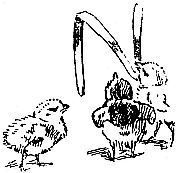
NO one bothered about Charlie; he was so happy and contented that the other children half thought he really preferred broken toys to whole ones. He toddled through life with a happy smile on his face, made a gee-gee of the old bench in the back-yard, and never once envied Tommy his fine new Dobbin.
It was not only in the matter of toys that Charlie failed to receive his just share. When black Biddy had a brood of seven chicks, and each of the children claimed one as a special pet, it was the lame one that was called Charlie’s. One day, Mother found her little lad sitting by himself on the doorstep, with Hopperty, as the lame chick was called, huddled up in his pinafore. “What’s the matter, Charlie boy?” said she, for she noticed that the little cheeks were very white and the pretty blue eyes heavy.
“My head’s so funny, Mother!” said Charlie.
The next day there were six children playing in the field behind the house, and one little boy lay tossing on his bed upstairs.
Now, you would have thought that amongst so many children one would scarcely have been missed, but Charlie was. The children felt as though they could not play, now that he was not with them. Then they remembered what a sweet, unselfish little fellow he had been.
“We gave him the lame chicken!” said Dora regretfully.
“I never once offered him a ride on Dobbin,” sighed Tommy.
“I don’t think any of us were very kind to him,” said Alice. “He was so contented that we thought anything would do for him.”
The week that Charlie was ill was the most miserable the children had ever spent, and when at the end of that time the Doctor said the worst was over and Charlie began to mend, there was nothing his brothers and sisters would not have given him, they were so thankful. The chickens were secretly carried up to Charlie’s bedside, but Mother said she could not have the sick-room turned into a poultry-yard.
“But we gave him the lame chicken,” the children pleaded; “and oh! Mother, we are so sorry!”
“Well,” said Mother, “he loves Hopperty best now; but, my darlings, Charlie will be down amongst you all soon, I hope, and then you must remember to try and be as unselfish to him as he has always been to you.” The children did not forget Mother’s words, and as for Charlie, he is the happiest little boy in the world, and the other children are all the happier too, I know, for having learnt to be a little more like their unselfish little brother.
L. L. Weedon.
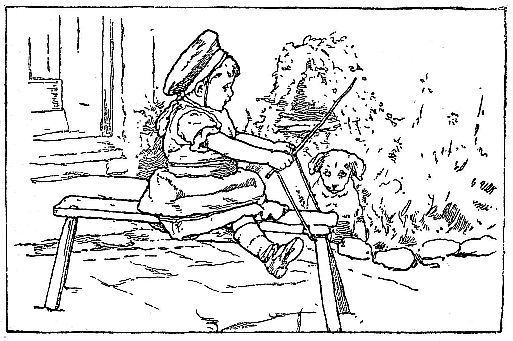
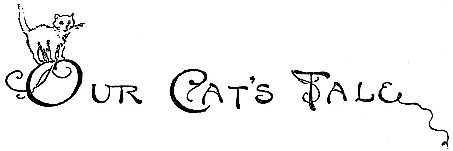
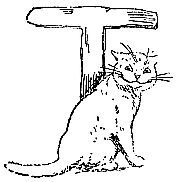
THIS is a true story, but you needn’t believe it unless you like. It happened to a cat I know, who has never said anything untrue in her life. One day when this cat had gone down to the sea to bathe, she was standing on the steps of her bathing-machine looking at the sea and wondering whether it would be cold—as I daresay you have often done—when she saw something golden and gleaming in the water. She thought it was a fish, and dived into the water at once. But it was no fish; it was a yellow sea-cat, with fins and a fish’s tail—a sort of cat-mermaid.
The cat who told me the story said that the sea-cat took her by the paw and led her down into the deep parts of the[51] sea and showed her wonderful things. Everything in the sea-cat’s world is just the opposite of what it is here. Whatever is wet here—milk, for instance—is dry down there; and whatever is dry here—such as a cat’s bed—is wet there.
But I never allow my friend the cat to talk much of this adventure. Not because I don’t believe her; but because I think it may make her proud if she talks too long about the wonderful things she saw there. Anyhow, I don’t see how you can doubt a cat’s word. A cat hasn’t any words, do you say? No—that’s just it.
E. Nesbit.


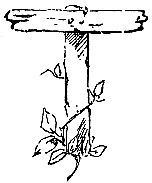
TOMMY would not learn his lessons. He wouldn’t do his sums, he upset the ink over his geography book, and smashed his slate. He tore a leaf out of his grammar and made a paper boat of it. He ought to have been punished, but he wasn’t, because his Mamma thought that dear Tommy must be ill or he wouldn’t behave so badly; so, thinking the fresh air would be good for him, she asked him to pick her a bunch of buttercups out of the meadow, but Tommy said he would rather not—he didn’t want to do anything ever again.
Tommy was not a bad little boy generally, but sometimes the idle fairy, who is no bigger than a grain of mustard-seed, though very strong, sat in his ear and whispered naughty things to him. He threw all his lesson-books in a heap on the school-room floor, and went out to the orchard, where he ate seven big apples one after the other,[53] and lay on his back looking up at the apple-trees, and trying to feel glad that he had had his own way. Presently he sighed.
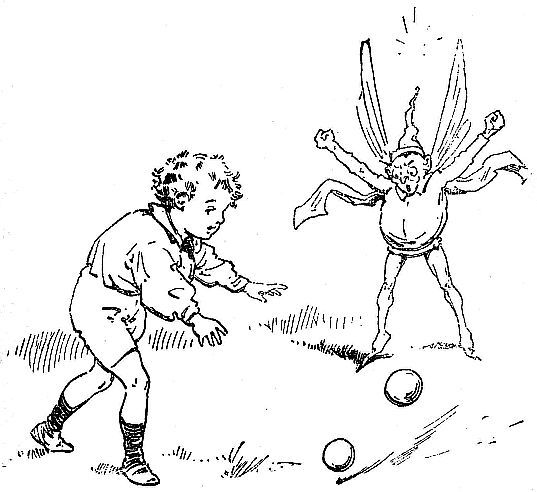
“What do you want?” said a voice, and Tommy saw a little red-cheeked man in a green cap, swinging on one of the apple boughs and looking at him.
“I only want to do nothing,” whined Tommy; “it’s very hard they won’t let me.”[54]
“Oh, if that’s all,” said the little man, “come with me,” and, taking Tommy’s hand, he led him through a convenient little door which opened in the trunk of the apple-tree. It led straight into the most beautiful garden in the world.
“Now then,” said the little man, “do nothing as hard as you like.” And he plumped Tommy down on a grassy bank.
Presently a troop of merry children came by with balls and hoops. Tommy jumped up to catch a golden ball that rolled his way.
“Lie down, sir,” said the little man, for all the world as though he had been a dog, Tommy thought; “you wanted to do nothing, remember!”
“I meant no lessons,” said Tommy.
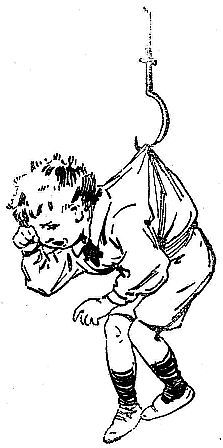
“You didn’t say so,” said the little man. “Besides, all those children have done their lessons, or they would not be allowed to stay here.”
Some more children came by riding on white ponies. One pony had no rider. Tommy started up. It would be lovely to ride that long-tailed pretty little pony.
“Lie down, sir,” said the apple-man[55] crossly; “you came here to do nothing and I’m going to see that you do it.”
“I am doing something anyhow,” said Tommy suddenly. “I’m sitting down.”
“All right,” said the apple-man; “we’ll soon settle that;” and a strong hook suddenly caught Tommy by the back of his clothes and hung him up in the air. “Now you are not doing anything, anyway,” said the little man; “the hook is doing the work.”
Imagine being hung up by a hook just out of reach of everything, while long processions of little green men came and offered you all the things you wanted most in the world—cricket-bats and ferrets, paint-boxes and hard-bake, guinea-pigs, catapults, and white mice, marbles, buns, and sheaves of letters with valuable foreign stamps on them. Tommy cried with rage, but the little apple-man only laughed, and kept saying: “How[56] do you like doing nothing, eh!—jolly, isn’t it?” Then he saw his Mother coming along the path, and to his horror he saw that a leopard was slinking after her. He called aloud, but she did not hear.
“Oh, let me go and drive the leopard away,” he cried to the little green man; “it will eat my Mammy—I know it will. Oh, Mammy, Mammy!” but she did not hear, and the little man said: “Oh, nonsense! if you haven’t got the pluck to master a simple addition sum, you can’t master a leopard, you know”; but Tommy struggled so hard that the hook gave way and he fell with a bounce on the orchard grass. He rushed off to find his Mother. To his delight she was safe, and there was no leopard about in the house or garden.
He threw his arms round her neck. “Mammy,” he said, “I do love you so. I’ll learn everything and do everything you tell me.”
“Ah!” thought his Mother, “the fresh air has done him good.”
But it was not the fresh air; it was the little apple-man.
E. Nesbit.

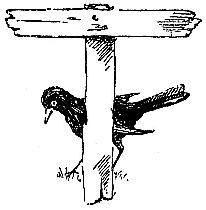
TODDLES was a greedy boy. If ever he had a cake or and orange, he would go away by himself to eat it, so that he might not have to give any away. He was a very greedy boy.
One day he sat on the fence at the end of his mother’s garden eating a slice of bread-and-butter, and an old crow flew down from a tree close by and looked at the food longingly.
“I’m hungry,” said the crow, for Toddles lived in the land where birds can talk. “Give me a few crumbs of your bread.”
But the greedy boy took no notice; he just went on eating the bread-and-butter and never offered the bird a crumb. Then the hungry crow turned upon him angrily, and pecked his bare legs until he screamed with pain. Down the garden path ran Toddles, and the crow ran after him. At each step the boy seemed to dwindle and grow smaller, whilst the crow grew and grew, until he was larger than the largest eagle.[58] Then he made a peck at Toddles, caught him up in his beak, and flew away with him, and put him into a cage that hung from the topmost branch of the tallest tree. “There you shall stay,” he said, “until you have learned to be a better boy.”
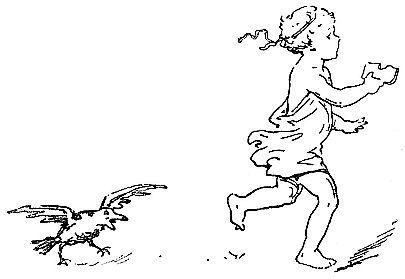
It was dreadfully uncomfortable in the cage, and Toddles cried and screamed until he made himself quite ill, and the crow sat on the branch beside him and teased him and laughed at him the whole day long. When the next morning came, the bird gave him a piece of bread and left him. He had just begun to eat it, when a little voice beside him piped, “Give me a crumb!”
It was a little Jenny Wren, and she[59] looked so pitifully at the boy that he broke off a corner of his food and gave it to her. Toddles could have eaten it up in no time, he was so hungry, but just as he had commenced he heard a little dog barking on the ground below. It was a thin, starved little creature, and Toddles, whose heart was growing much softer, broke his morsel of bread in two, and threw half to the dog. The next morning the little boy was very hungry indeed, and the food that was given him was less than ever. Just as he was going to eat it, he heard a child crying, and, peeping between the bars of his cage, he saw a little hungry child. She had had no food for days, she said, and Toddles was so sorry for her that he dropped her the whole of his breakfast. Then the crow came swooping back, opened the door of the cage, and taking the little fellow in his beak, flew back with him to his mother’s garden, and dropped him on the fence where he had first found him.
“You have learnt your lesson, Toddles,” said he, “so there is no need to punish you any more.” And Toddles had learnt a lesson, for he was never greedy again.
L. L. Weedon.

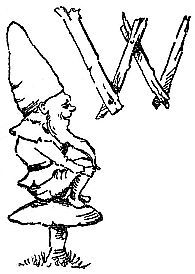
“WILL you get out of my way, lumbering elf? This is the third night I have tumbled over you.”
“Softly, good Father Sandman, softly! If you were not so blind you would have seen me. Have you put all your children to bed, old Father Sandman?”
“Go along for a teasing, impertinent imp!”
Pipistrello laughed shrilly as he swung himself to and fro on the branch of a low shrub, chanting—
“Close, little eyelids, close up tight, for the Sandman’s come to town!”
The old fellow had gone into his cave; it was nearly dark now. Boum! An old brown shoe came flying out, and, catching the elf as he swung, toppled him neatly on to the grass beneath. He was not hurt, for the Sandman goes very softly shod, that[61] the children may not hear him. But he was extremely angry. “Very good!” he cried, shaking his morsel of a fist; “to-day you, Father Sandman, and to-morrow me! Mark my words, you will be sorry for it before the moon is many nights older.”
A chuckle was heard coming from the cave, and that was all. Pip went off, meditating revenge. In the middle of supper he snapped his fingers gleefully. “The very thing,” he cried; and he began to hum; “Close, little eyelids, close up tight, for the Sandman’s come to town!”
Old Father Sandman was hunting about his cave in a fine state of mind. “Ach! where is my bag of sand? Where can it have gone? It is the children’s bedtime; the Nurses and the Mammas will be wondering where I am! My sand-bag, my precious sand-bag—oh, if I could but find it!” The poor old gentleman trotted to and fro, and seemed nearly distracted.
“I wish I could help you,” said a bat, who generally shared his cave; “I have been asleep all day, you know, and have seen no one.”
“If you will let me ride on your back,”[62] cried the old fellow eagerly, “I might catch my brother Sandman, who lives the other side of the wood, before he goes out. He would lend me some sand, perhaps.”
“Come along then,” said the bat.
But the second Sandman declined to help. Poor Father Sandman got back to his cave, and there was Pip swinging on the same branch as before, and looking very malicious. “I believe,” gasped the old gentleman, “that it is you that stole my sack!”
Pip laughed, and skipped out of reach, crying: “My turn to-day, Father Sandman.”
But although mischievous, he was not a bad-hearted sprite, and presently he went and fetched the sand-bag. Then he made a bargain. “Father Sandman, will you say you are sorry?”
“Pipistrello, I will say I am sorry,” was the reply.
“And you won’t bear malice?”
“I will not bear malice—give me my bag.”
“One thing more. Will you let all the children sit up half an hour longer in winter, and an hour in summer?”
“It can’t be done—well, perhaps, if I must—yes, then; but the babies must go to bed a quarter of an hour earlier all the year round.”
“Please yourself about the babies,” said Pip. “Catch, Father Sandman!”
The next minute the old fellow, with his sack on his back, and a smile on his face, was trotting off to the town.
Sheila.
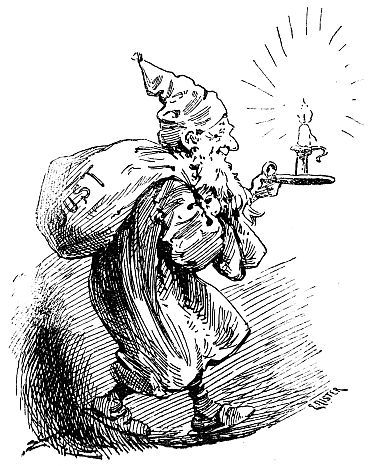

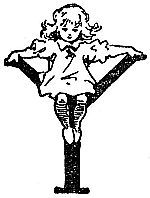
YOU mustn’t go into the morning-room, Dodo—don’t forget, will you?
“No, Mother,” Dodo answered, but she didn’t seem very pleased. It happened that she was a very curious little girl, and always liked to know what was going on, and she was quite certain that something interesting was taking place now.
Mary and Eric had just come out of the morning-room, whispering together, and if Eric, who was younger than Dodo, might go in, she thought it was very unkind of Mother not to let her.
Dodo was so cross that she sulked nearly all the afternoon, and was so tiresome when nurse was dressing her to go down to the drawing-room, that the other children were ready long before she was.
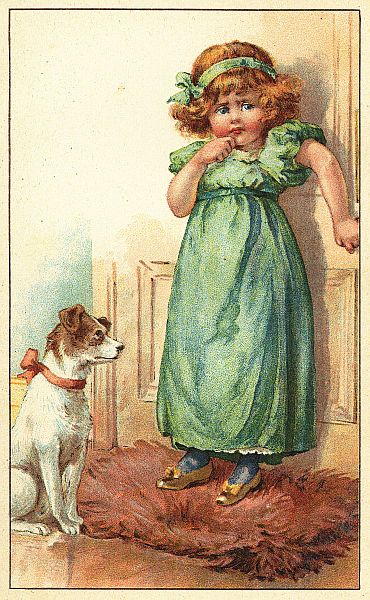
But at last she trotted downstairs, with Spot at her heels—Spot always waited for[65] Dodo—and as the two of them passed the morning-room door, they both stopped.
Strange to say, Spot was quite as curious as Dodo. He sniffed at the door, and whined, and wagged his short stumpy tail violently to and fro. The little girl’s hand was on the handle of the door. Should she turn it? Surely one little peep couldn’t matter?
It always seemed to Dodo that the handle turned of its own accord. I don’t think it could have done so, but at any rate the door opened a little way, and out dashed a fluffy white kitten. In an instant Spot was after it, and chased it down the hall and out into the garden.
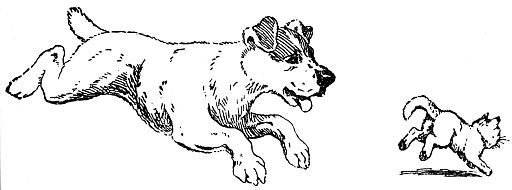
Dodo didn’t know what to do; she couldn’t very well run after Spot, because just at that moment Mary called her.
“Be quick, Dodo; Mother wants you,” she said. So Dodo went into the drawing-room[66] feeling very guilty, and soon afterwards Spot came in, licking his lips.
“Had he eaten the kitten?” his mistress thought, but she didn’t dare say anything.
The next morning when Dodo came down to breakfast, she found all sorts of nice presents laid out beside her plate.
“They can’t be for me,” she said, but Mother kissed her and said:
“Yes, they are, my pet. You surely haven’t forgotten that it is your birthday? I am so sorry that I have no present for you, but yesterday I bought you a little white kitten and shut it up in the morning-room. Some one must have let it out, for we can’t find it anywhere.”
You can think how Dodo felt then. She grew redder and redder, and then she burst out crying. After that she did the best thing she could have done. She told Mother all about it, and Mother kissed and comforted her, and forgave her, but she made her promise to try and not be so curious or so disobedient again.
And before breakfast was over, what do you think happened? Dick, the gardener’s boy, brought in a lovely white Persian[67] kitten, that he had found in the tool-house. Of course, it was Dodo’s, and it was the very sweetest and dearest kitten in the world.
Spot was inclined to be jealous of the new pet, and was very naughty at first, barking and snapping at it in a very rude manner; but in the end even he couldn’t help liking the pretty little fluffy thing. Before a week had passed he and Snow became the very best of friends, and he wouldn’t have chased that kitten for the meatiest bone in a whole butcher’s shop.
L. L. Weedon.
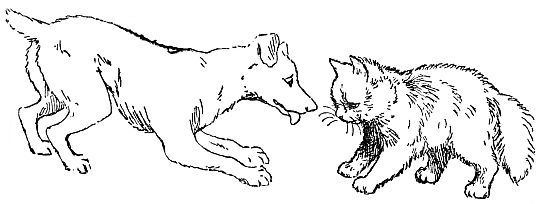


THERE were once two little white rats who lived in a hutch with wide bars. They had plenty of soft hay to sleep in, and bread-and-milk at the proper times. But they were dull, for they never saw the world, and they had nothing to talk of in the long winter evenings. One winter day a Fairy knocked at their door.
“I am cold and hungry,” she said, “and Fairyland is a long way off; I can never get there in this snowy weather.”
“Come in,” said Mrs. Whiterat, and the Fairy crept in through the bars. Mr. Whiterat gave the Fairy some bread-and-milk, and Mrs. Whiterat sat close beside her in the hay—so that soon the Fairy felt quite warm and cheerful again. And she lodged with the white rats all the winter, and they were all three as happy as could be.
Then when spring came, and the daffydowndillies were waving their yellow heads[69] in the sun, the Fairy said: “I must go home now. You have been very good to me. You may have three wishes.” And she waved her little wand and flew away.
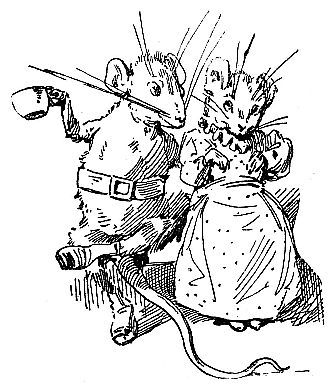
Now, the white rats had often longed to be free, to run about under the haystacks, and bring up large lively families, like the brown farm rats. So now they said—
“Oh! I wish we were out of the hutch!” And in a minute they found themselves among the hayricks.[70]
“Oh! how big and beautiful the world is,” they said.
And then a dreadful thing happened. A great brown rat jumped out at them.
“Get along with you!” it said. “We don’t want any toy-rats here.” And it showed its sharp teeth and looked so fierce that Mrs. Whiterat trembled to the end of her grey tail, as she cried out—
“Oh! I wish we were safe in the hutch!” And the same instant, there they were at home again.
And the third wish? Well, they haven’t made up their minds about that yet. It gives them something to talk about in the winter evenings!
E. Nesbit.
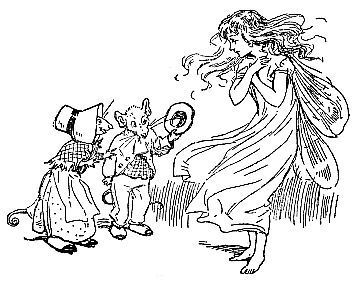

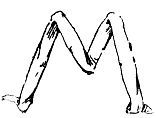
MR. and Mrs. Stoat lived with their children in a comfortable home. They were very well off—they always had plenty to eat, and their fur coats always fitted beautifully and were never shabby.
Every day, when Mrs. Stoat was busy with the house work, she used to send the children out for a walk, and one day, when the children were walking in the wood, they saw two ladies coming down the path.
The little Stoats hid in a hole in the mossy root of a tree, and as the ladies went by, one of them said: “I wonder what fur will be worn next winter?”
“They say,” answered the other lady, “that nothing will be worn except——”
But the little Stoats could not hear what fur it was that was to be worn next winter. They did not like to think of other people wearing fur, for fear their own fur[72] coats should be taken from them. “Oh! how cold we should be without our coats!” they said, shivering; but then the most sensible Stoat said: “It can’t matter to us what big people wear! Our coats wouldn’t fit them, you know.”
But the smallest Stoat of all felt quite anxious to know what fur would be worn, because she was a vain little person, and felt it would be very sad if Stoat-fur coats were not the fashion.
So when she went home to dinner she asked Mrs. Stoat the question.
“Mother dear, you know everything. Do tell us what fur will be worn next winter.”
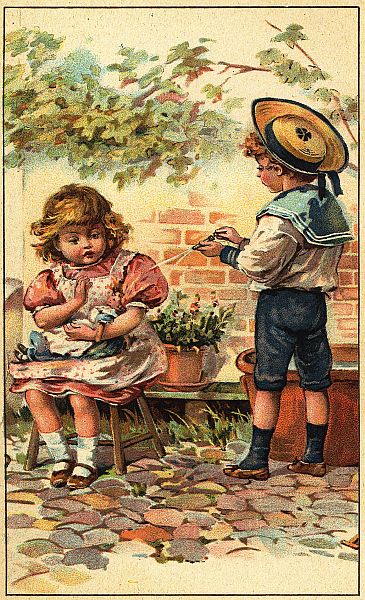
“Why, Stoat-fur, of course,” the Mother answered, laughing; “unless——” She stopped short and looked at Mr. Stoat, who nodded and then they both laughed, and everyone sat down to dinner. But that silly smallest Stoat of all couldn’t sleep for thinking of that “unless.” What could it mean but that perhaps some other fur would be worn? And then unfashionable! It was a dreadful thought. Before morning she had made up her mind to go out into the great world and find out what fur was to be worn next[73] winter. So she said nothing to anybody, but she started off alone; and perhaps she would soon have seen how silly she was and have come running back again, but, alas! she was caught in a trap, and the keeper who caught her would have killed her, only his little daughter begged so hard that the keeper agreed to spare the little creature’s life. So the smallest Stoat of all was kept in a hutch.
And there she stayed for weeks and weeks; and when it grew very cold the hutch was put in the stable, so that she was always warm; but she longed to get home again.[74]
“I don’t think I should care about not being in the fashion,” she said sadly to herself, “if only I could go back to my dear Mammy and the old home!”
Now, one day two ladies took refuge from a snowstorm in the keeper’s house, and as they passed the stable the smallest Stoat of all heard one of them say: “You see, I was right. Nothing is being worn but ermine!”
And the little person in the hutch recognised the voices of the two ladies she had seen in the wood. So now she had found out the great secret! And it so happened that the very next day someone left the door of her hutch open, and she slipped out very cautiously, lifting up her little head and turning it from side to side, and sniffing to make sure that there was no danger near.
Then she started to run across the snowy fields to her old home. But as she ran she heard feet behind her—and ran faster and faster—a little brown streak on the snow. And the feet came faster too. They were a dog’s feet—and she heard the dog’s quick breathing close behind her as[75] she rushed into the old home, and knew she was safe. As soon as she had got over her fright enough to look about her, she received another shock; she was in the midst of a number of strangers all dressed in creamy white fur dresses who were only like her as to their neat black tails.
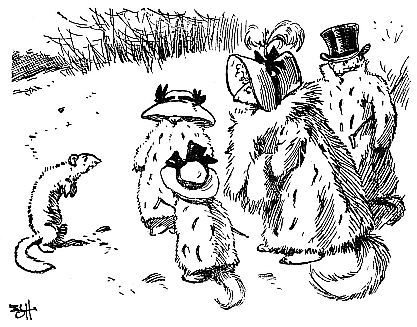
“I’m sure I beg your pardon,” she said; “I thought this was the house where my Father and Mother lived.”
“So it is,” cried the white furry people, laughing. “Don’t you know us?” And then she saw that these were really her own relations, only their dresses were new.
“We are wearing ermine now,” said Mrs. Stoat proudly.
“Oh, Mother, can’t I have an ermine dress too?” cried the youngest Stoat of all. “Nothing is being worn but ermine. I heard them say so.”
“Something else is being worn by you, at any rate,” said Mrs. Stoat sternly. “You’ve been living in some warm nasty place. If you’d stayed here in the cold like a good little Stoat, instead of running away from home, you would have had an ermine dress like everyone else.”[76]
“Don’t you know, silly child,” said Mr. Stoat, “that we always get ermine coats in very cold winters? Then dogs can’t see us so well in the snow. It’s very cold still. If you try hard perhaps you can get an ermine coat like the rest of us.”
But the smallest Stoat of all never got her ermine coat, for the spring came quite soon, and there has not been a really hard winter since.
E. Nesbit.
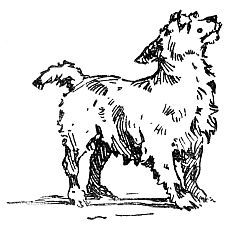

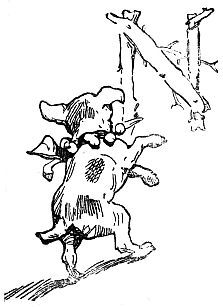
NELL had disappeared, and no one could find her anywhere. Poor Baby cried till his pretty eyes were all swollen and red, for Nell was his favourite playmate, and he missed her dreadfully.
“Never mind, old man,” said Mother, kissing him. “She’ll come back again some day.” And so she did.
One day a little half-starved ragged-looking dog came creeping up to the nursery, and Baby uttered a shout of joy. “Mamma, Mamma,” he cried, “Nell’s come back.”
The good little dog licked Baby’s hands and face, and wagged her tail by way of saying, “How are you, darling Babs, after all this long time?”
But, when Mother set a dish of food before her, she gobbled it up in no time, and then, scarcely waiting to say “Thank[78] you,” she ran out of the nursery, downstairs, and after that no one knew what had become of her, for she was lost again.
However, the next day she came back again, and the next, and the next, and one fine morning she trotted up to the nursery, dragging with her the sweetest little puppy you ever saw.
Poor doggie! she was very proud of her little son, but oh! so frightened lest any harm should come to him.
Mother picked up the fat little fellow and put him on a chair, and then lifted Baby up to look, and Nell jumped upon the chair beside her son, and looked piteously up into Mother’s face.
“All right, old dog,” said Mother; “I wouldn’t harm your baby for anything, because you are always so good to mine.” Nell understood in a moment what Mother had said, jumped down from the chair, and ran towards the door, whining and looking back.
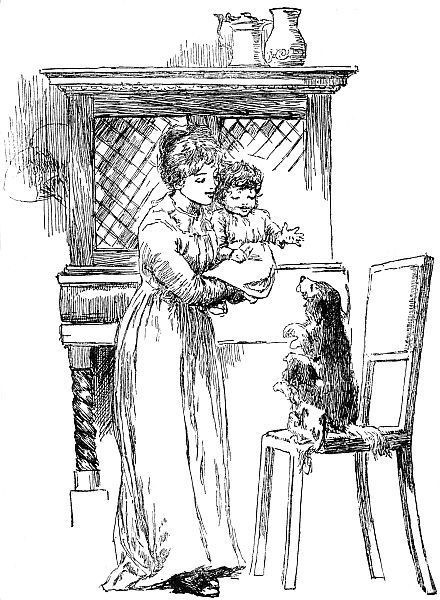
Mother knew she was meant to follow;
so she and Baby went with the little dog,
who led them down the garden towards the
stables, and then up into the hayloft, and[79]
[80]
there, behind a large truss of hay, they
found four other dear little puppies, just
like the one Nell had brought to the nursery.
They carried them into the house, and Baby was allowed to keep one, which he trained to become a very clever doggie, and the others were sent to the Home Farm.
And why do you think Nell had kept her secret so well? She had been afraid that someone would rob her of her darlings; so she had hidden them up until they were old enough to trot about nicely, and were so sweet and pretty that she was sure no one would have the heart to harm them.
L. L. Weedon.
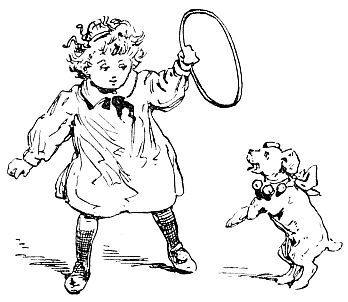

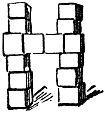
HIDE-AND-SEEK is a jolly game when you play it out of doors and there are a good many of you; but when you have to play it indoors and there are only two of you, you have to make the dolls play too. Molly and I used to each be captain of a side; she had nine dolls and I had only seven; so our side had much more looking to do than hers.
One very snowy day, when we couldn’t play in the garden, we had tried all the games we could think of, and Molly was getting crosser and crosser because she could not draw Selina properly, when I said: “Let’s play hide-and-seek.” Molly said: “All right, only I don’t know where half my dolls are. You must lend me some of yours. I’ll have the talking one and the one that shuts its eyes.”
I didn’t like this very much, but I gave in. “And our side will hide first,”[82] said Molly. I didn’t like that either, but I gave in again.
I said good-bye to my dear Rosalie and Selina, and handed them over to Molly; then I turned my pinafore over my head and waited while she hid them.
“Cuckoo! cuckoo!” cried Molly, as a signal that all were hidden.
I soon found Molly; she was behind the window curtain, and made it stick out, of course; and I soon found her dolls and my Selina. Molly had hidden her in the coal-scuttle, and though she had wrapped her in a piece of paper, I didn’t think it was quite nice of her; but I couldn’t find Rosalie, the squeaking doll, anywhere. I looked in Nurse’s work-basket, I looked in the doll’s house, I looked everywhere you could think of—no Rosalie! Just then Molly had to go and have her dress “tried on.”
Hide-and-seek is no fun by yourself, but I couldn’t bear to think of Rosalie being hidden somewhere all alone, so I went on looking. It was beginning to get dark, and Nurse had gone down to her tea, and I felt very miserable and forsaken, when suddenly in the quiet Nursery I heard[83] Rosalie’s well-known squeak. The dear doll, she was calling to me! The sound came from the chest-of-drawers. The drawers themselves we were forbidden to open, but I pulled out Nurse’s work-drawer, and there, lying on the cut-out flannel petticoats, was my precious Rosalie. What I had so often wished had come true, no doubt. Rosalie had squeaked by herself. If she could squeak she could talk, and what interesting talks we should have! I told Nurse all about it when she came up from her tea.
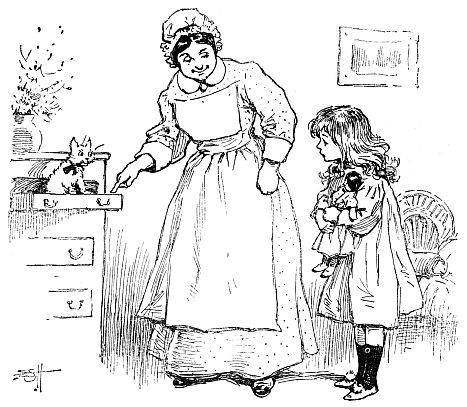
[84]“Bless you, my lambie,” she said; “dollies don’t squeak without something to make them.”
She went to the work-drawer and pulled it open. Lying curled up at the back was pussy.
“It was the cat you heard,” said Nurse; “or perhaps pussy sat on the doll’s squeak.”
It was a dreadful blow, but after all, I don’t think I quite believed that pussy had anything to do with it; and for a long time I used to take Rosalie into quiet corners whilst Molly was busy making her dolls new dresses, and beg her to squeak just a little for me, so that no one else should hear; but she never did, so that perhaps Nurse was right after all.
E. Nesbit.
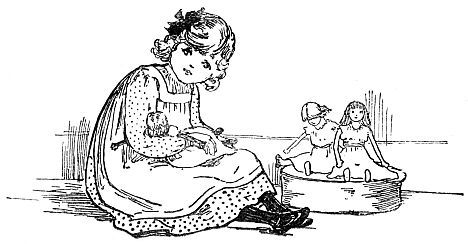


FAIRIES are all pretty, we know, but the Twelfth Night Fairy was really lovely. She wore a white frock and a wreath of pink roses. She had no shoes or stockings, and stood on the tip of one toe and waved the other foot in the air. Teddy thought she was lovely, and he felt hungry when he looked at her, although he had just eaten his supper of bread-and-butter and milk. How he wished he were grown up instead of being only five years old, so that he had to be sent to bed like a baby, instead of sitting up for Mother’s party!
“I could eat her every bit; she’s only sugar,” said Teddy regretfully.
“Never mind, old man,” said Mother; “you shall have a nice slice of the cake to-morrow.” So Teddy sighed deeply, mounted the nursery stairs, and was soon far away in Dreamland.
But the Fairy went to Dreamland too.[86] Teddy met her as soon as he crossed the threshold, and she told him she had been running after him ever since he left the supper-room.
“I wanted to tell you that I’m not sugar,” she said. “I’m a real live Fairy. And, oh! please, please don’t eat me! I heard your Mother say that she would give me to you, because you had been a good boy and went to bed without making a fuss.”
There were tears in the Fairy’s eyes, and she looked so piteously at Teddy that he felt inclined to cry too.
“I won’t eat you, dear little thing!” he said, kissing her. “If Mother gives you to me, I’ll keep you for ever and ever. But, oh dear! suppose someone else should eat you before morning?”
This was a dreadful idea, and the Fairy began to sob outright, so tender-hearted little Ted thought he would go at once and make his Mother promise that she would not let anyone touch the poor little pink-and-white Fairy.
It was not very far from Dreamland to the dining-room, and the little boy soon stood by his Mother’s side, with the bright[87] light from the waxen candles shining upon his golden curls and lighting up his pretty blue eyes. The room was quite full of people, but Teddy, who was a shy boy generally, didn’t mind a bit. “Oh! Mother dear,” he cried earnestly, “promise that no one shall eat the little Fairy.”
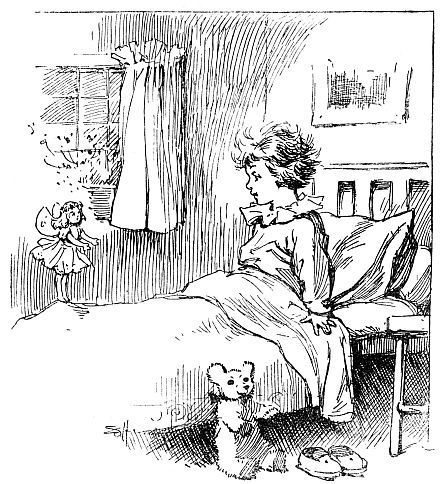
Mother picked him up and kissed him, and then someone put the Fairy—who[88] had followed him downstairs—into his hand, and in a moment he was fast asleep.
When he awoke in the morning the first thing he saw was his little friend, smiling at him from the top of the Nursery chest-of-drawers.
Teddy was so glad she was safe and sound, and he wouldn’t have eaten her for the world now, because, although she looked so sweet, he knew she was not made of sugar.
He grew very fond of her and carried on long one-sided conversations with her. She never answered him during the day, but at night she met him very often in Dreamland, and danced with him, and sang him the sweetest, quaintest songs, and Teddy says, when he’s a grown man, he’s going to marry the pink-and-white Fairy.
L. L. Weedon.
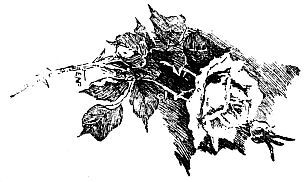

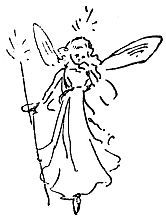
THERE was once a Fairy who lived in the hollow part of a quill pen. It was a very pretty palace for a fairy, with half-transparent walls. And hers was a happy life. The only thing that troubled her was that the man who used the pen only wrote logic and grammar and really sensible things.
“Why can’t he write poetry and fairy stories?” she used to say. “Oh, what beautiful things this dull man could write if he only knew that there was a Fairy in his pen!”
So one day when the man who used the pen had gone to a dull lecture, she wrote on the blotting-paper:—“There is a fairy in your pen!” “And now,” she thought, “he will surely let me help him to write poetry and fairy stories.”
But the stupid man thought the children had written the words on his blotting-paper,[90] so he sent them to bed, and the Fairy cried till the ink was quite pale from having so many tears mixed with it.
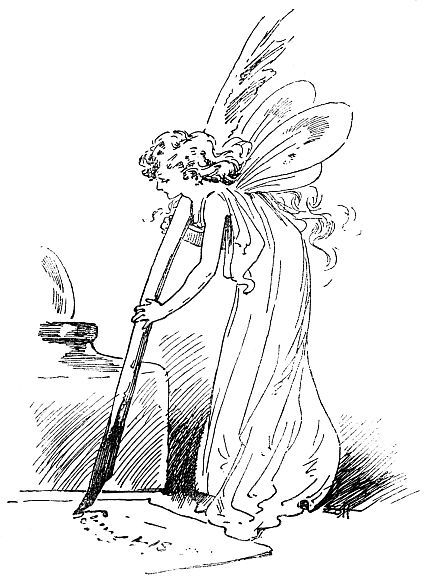
And the man, finding that his pen wrote worse and worse, threw it into his waste-paper basket. His housekeeper picked[91] it out. “I’ll mend this pen,” she said, “and use it for my books.”
“Oh! now,” thought the Fairy, “someone really is going to write fairy stories and poetry with me.”
But the housekeeper only used the pen for adding up the baker’s and butcher’s bills, and the Fairy got very angry. So she left the quill pen and came to live with me. And I try to be kind to her, and never hurt her feelings by writing logic or grammar or anything really sensible.
E. Nesbit.
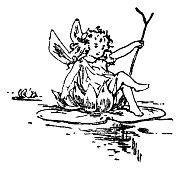

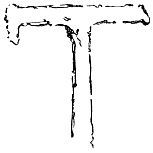
THERE was once a little girl who was so fond of dancing that she never did anything else.
She danced whilst she took her breakfast, so that her nice bread-and-milk was spilt upon the ground; she danced on her way to school, and was late in consequence; she danced when she took her dinner, and dropped the soup down her pretty frock and spoilt it; and even when she was tucked up in bed at night, her little feet kept dancing up and down beneath the bed-clothes, and she dreamt that she was treading a minuet with the King of the Fairies.
Now, of course this was very wrong indeed of the little girl. It is all very well to dance at the proper time, but out of time and season, as this little girl danced, it is a very bad thing indeed.
Her mother reasoned with her, coaxed[93] her, scolded her; but it was all of no use, for she danced the more.
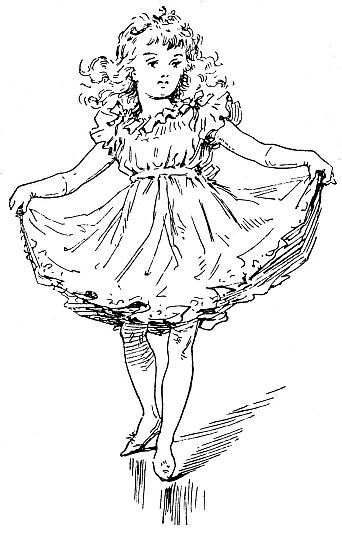
The little girl’s mother was very poor, and there were ever so many little brothers and sisters who wanted taking care of, but she was too selfish to think of anyone but herself; sometimes her mother would ask her to take the baby and hush him to sleep,[94] but she pouted and grumbled and made a terrible fuss. If she did take him up in her arms for a while, she kept dancing round the room with the poor sleepy little fellow, till she wakened him up, and then he would scream and cry, and would not be soothed till his mother took him again.
So you see, the foolish little girl was of no use to anyone.
One day when she was dancing to school as usual, she met an old woman upon the way. And because she stood in the pathway and the dancing maiden could not pass her easily, she danced across the old woman’s toes.
Now, it happened that the old woman was a fairy, and she was so angry and offended with the little girl that she determined to punish her.
“You shall have dancing enough to last you all the days of your life,” she said, and with a wave of her wand, she turned her into a chimney-cowl, which, as everyone knows, does nothing the livelong day but whirl round and round till it almost makes one giddy to watch it. And the next time you go out for a walk, you have only to[95] look upwards to where the chimneys grow, and you may see for yourself the little dancing-girl, who was so rude as to tread upon the fairy’s toes, going whirl, whirl! the whole day long, whether she will or no.
And the moral of this story is—“Don’t dance out of time and season, and don’t tread upon old women’s toes, or there is no knowing but what you may be turned into a chimney-cowl also.”
L. L. Weedon.
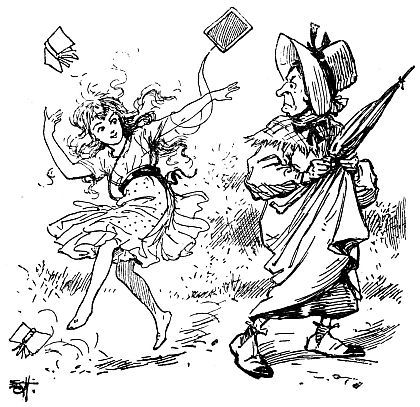


IT’S a dreadful thing to be a doll, children are so inconsiderate. I myself have lost an arm and a leg through their rough handling, and once I trembled for the safety of my head. Master Johnny wanted to play at Mary Queen of Scots being executed.
I was quite relieved when Dolly said that Mary Queen of Scots had been very beautiful and that I could never be made to look like her; it was not flattering, perhaps, but it was safe.
They gave up that idea and then Johnny said they would go out and fly his parachute. I thought that now I should be left in peace for a short time, but no! Johnny caught me up, tied a string round my waist and fastened me to the end of the parachute, and then those two cruel children climbed up to the top of the garden wall and dropped me over.[97]
It is not altogether unpleasant to sail through the air with a parachute, but the bump when you reach the ground is terrible. I think I must have fainted away, for I remember nothing more until I found myself lying on a bed of violets with a tiny little creature sitting beside me who asked me how I felt. The string which bound me to the parachute had broken and I was free again, but I felt very stiff and uncomfortable.
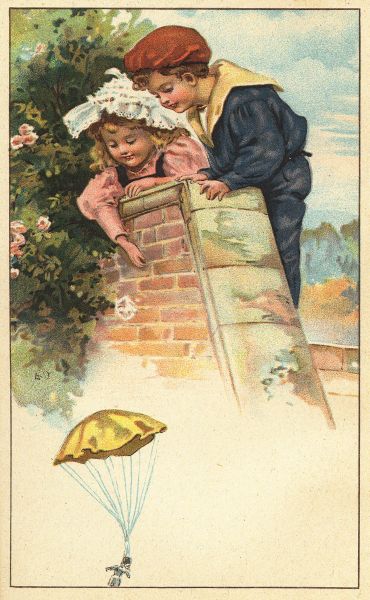
However, I managed to reply politely to the little elf’s question, and having explained how I came to be lying there, on the wrong side of the garden wall, I added that I trusted I should never have to go back again. “What!” cried the elf, “you would really be contented to remain here always?” I answered that I should, and he then ran off and consulted with a group of elves who had been watching us from a distance.
When he returned he told me that he and his companions had long been wanting a queen, and seeing that I was so much larger and handsomer than they, they had decided to offer me the crown.
Of course, I was obliged to hesitate for[98] a short time—it isn’t good manners to appear too eager about anything—but I meant to accept in the end, and was just preparing a nice little speech, when I was grabbed—yes, grabbed by a dirty little hand and thrown over the wall, where Dolly caught me. Of course it was Johnny—that boy always was the bane of my life, and it was like him to spoil all my prospects.
However, Dolly was so glad to have me back again that I was a little comforted, though I have never quite got over the shock of my voyage over the garden wall.
L. L. Weedon.
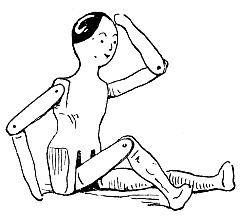

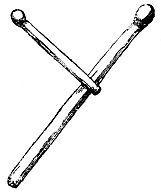
YOU would never think, to see the Matches lying so quietly in their box in the daytime, that they really have rather a pleasant life, and very exciting adventures. But they do. Every night the Matches creep out of their box and hide it, and put on pretty paper frocks and coats, and go and dance with their friends. That is why you can hardly ever find a match-box in the dark, and if you do it is almost always an empty one.
Well, at one of the Match parties a young wooden Match with a red head fell in love with the sweetest little Princess of a Wax Match you ever saw. She wore a white smooth frock, and her head was brown.
“How I love you!” said the Red-headed Match.
“And I you!” said the brown-headed[100] little lady. “But they tell me your box is in the kitchen. That is very low.”
“Never mind,” said the lover; “I will come and live with you.”
So when the party was over the two went to live in the mother-of-pearl box in the drawing-room. And that was high life indeed.
But the Queen of the Wax Matches was very angry.
“She has married beneath her,” she cried; “off with her head!”
And sure enough at that moment the housemaid came to light the fire, and she struck the little white Princess Match against the bar of the grate, and her brown head fell off! The wooden Match did not want to live now his lady was beheaded, so he pressed forward into the housemaid’s hand—and she struck him and lit the fire with him; and what was left of him fell beside his white lady. So the two faithful lovers were buried together in the ashes.
E. Nesbit.
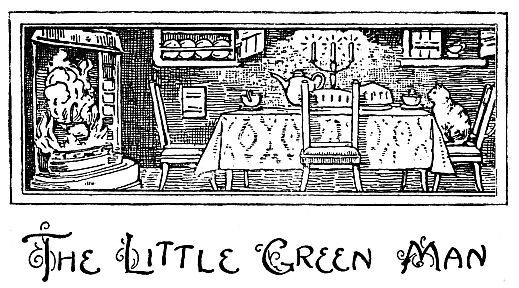
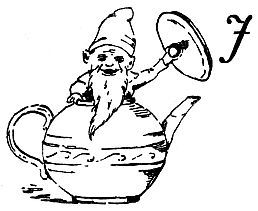
JUST as the Mother was going to make the tea, she heard a funny, faint voice from the tea-pot, crying:
“Oh, please don’t scald me with the boiling water! Take me out! Take me out!”
The Mother, greatly astonished, peeped into the tea-pot—it was one which she had not used for some time—and saw there a queer little man, dressed all in green, with a green cap upon his head.
“How did you get into my tea-pot?” asked she.
“A cruel Fairy put me here,” replied the little man; “please, oh, please take me out!”
The Mother took him out, and placed him upon the table. How delighted the children were to see him trotting round and round, taking tiny sips from their cups, and crumbs from their plates!
“Is it a doll, Muvver?” asked Baby.
“A doll, indeed!” exclaimed the little green man; “I am no doll! Did you ever see a doll walk, or hear a doll talk? I am a man!” And he stood on tip-toe and straightened himself up in such an amusing fashion that all the children laughed.
When bed-time came, the little green man was put to bed in the doll’s house. But early in the morning, Dora was awakened by something tickling her nose. Opening her eyes, she saw the green man standing upon her pillow.
“You darling!” said Dora; “you shall go into the garden with me, and see my pretty white rabbits.”
Jumping out of bed, she dressed herself as quickly as possible; then, with the little man standing on one hand, and some green food for her pets in the other hand, she ran down the garden. When she got to the hutch, she fed the rabbits with the[103] nice, fresh, juicy cabbage-leaves, while the little man looked on with much interest. The rabbits were very hungry, and when they had eaten all the leaves, one of them made a sudden snatch at the little green man, and ate him up also. Being rather short-sighted, it mistook the green man for a leaf.
Such was the sad fate of the little green man!
E. Dyke.
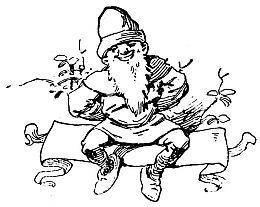
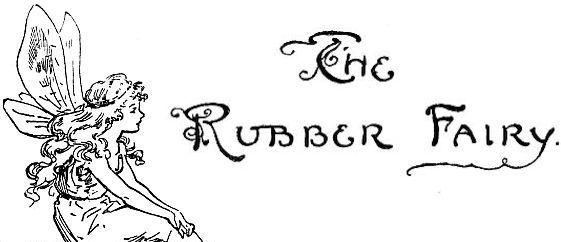
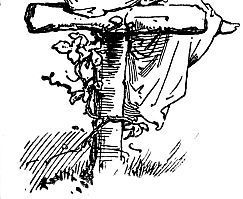
“THERE are no fairies, did you say? Why, whatever are we coming to?” said Uncle James.
“But I’ve never seen one,” said Harry.
“I daresay not, but what do you suppose makes your ball bounce? Why, the fairy inside it, to be sure.”
Harry laughed at the time, but afterwards he couldn’t help thinking about it. Did fairies really live in india-rubber balls? If not, what made them bounce?
He thought and he thought and he thought—and at last he took out the new brown-handled knife Uncle James had given him, and he cut a hole in his india-rubber ball.
“Now I shall know!” he said. And he looked inside—but he was no wiser[105] than before. But that night when he was in bed he saw a little lady, with gray gauze wings, sitting on his pillow.
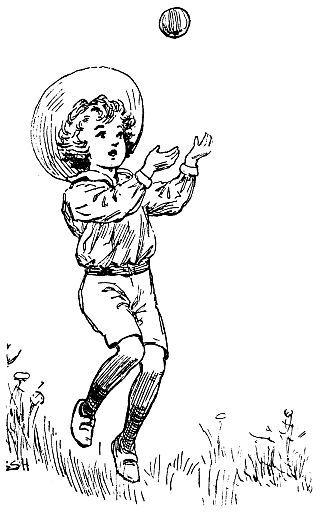
“Thank you so much,” she said, “for letting me out. A wicked enchanter shut me and my million brothers up in balls, and when we struggle to get out, the balls bounce.”
Then she vanished. Next morning Harry thought he had only dreamed about her, so he ran to his ball; but there was the hole he had made, and sure enough the ball never bounced again.
“Because there is no fairy in it,” Uncle James says.
E. Nesbit.

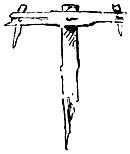
THE gilt button shone and sparkled on Tommy’s coat and was absurdly proud of himself. Tommy had sewn him there with a piece of string and a packing-needle, one morning when his Mother was too busy with the baby to attend to him. He went to school with the little boy and listened with glistening contempt and dignity to all the master had to say. He had a very small opinion of the master, for he hadn’t a gilt button upon his coat, and he couldn’t understand why Tommy’s heart went pit-a-pit at such a rate when the schoolmaster asked him a question. The rest of the boys rather made fun of Tommy’s button; but then, of course, that was jealousy on their part. They would have liked one well enough themselves; at least, so the button thought.
At night, when his chubby little master was fast asleep, with the old coat folded up tidily on a chair beside the bed, the[107] foolish button began to boast and brag about his grandeur, and this didn’t quite please the other buttons. They had lived on Tommy’s coat much longer than he, and they didn’t see why he should give himself such airs. They were quite ready to be friendly and kind, but they did not want to be looked down upon, and so in a very little time they were all quarrelling.
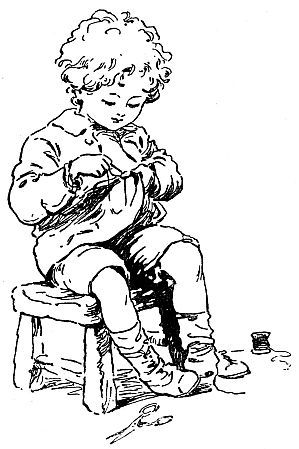
Presently Tommy’s Mother stooped over the child’s bed and kissed him. She was[108] very fond of her boy, and with good reason too, for he was always bright and cheery, always helpful and loving, and only the poor overworked woman knew what the little lad was to her. As she turned from the bed the glitter of the gilt button on the worn old coat caught her eye and she smiled at the sight of Tommy’s tailoring.
“Poor little lad,” she sighed; “it’s a shame to let him go so shabby,” and she carried the coat downstairs and began to mend it neatly.
Now, the very first thing she did was to cut the gilt button off the coat and put a sober black one in his place, and it happened that she let the gilt button fall, and he rolled away under the hearth and lay all night long amongst the dust and ashes.
In the morning little Tommy felt quite grand in his tidy coat, though certainly he had a pang when he found his gilt button had gone. He went downstairs, and, finding his Mother had overslept herself, set to work to clean the hearth and light the fire, and very pleased he was when he saw his old friend again amongst the ashes. He[109] slipped him into his trousers pocket, and there the button lived for many a long day. Tommy grew to really love him, and wouldn’t have parted with him for anything. When rich boys jingled the pennies in their pockets, Tommy shook up the gilt button against a piece of slate-pencil, and it sounded almost as well.
And what did the gilt button think about it? He liked it; yes, he really did—at least, as soon as he got used to the dark depths of the trousers pocket. He found out, don’t you see, that Tommy loved him, and everyone knows, the wide world over, that it is better, yes, a thousand times better, to be loved than to be admired.
L. L. Weedon.
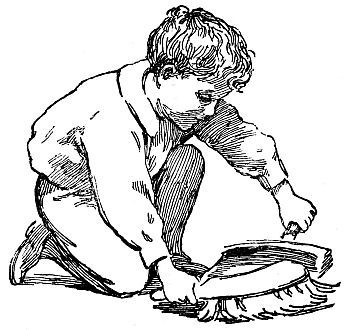


THERE was once a Fairy who lived in a big library. It was rather a dull place to live in, but the Fairy liked quiet. One day the room suddenly grew noisy, and the Fairy peeped out from behind the poetry-book where she lived, and saw two children playing. They were building a house with the big books, a solid calf-skin house, with a vellum roof.
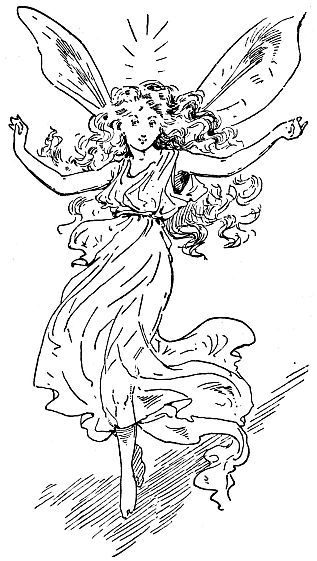
“This would be a nice house for me,” said the Fairy, “rather large perhaps, but I like plenty of room. That poetry-book was too thin!” So she crept under the roof, which was made of a volume of Rollin’s Ancient History. Her new house was rather musty, but it was large and comfortable. She was just settling down when a prim little girl leading a fat dog came into the room and scolded her little brother and sister, shut up the Ancient History, put it[111] up back on the shelf, and the Fairy was shut in it. She had to make herself very small, I can tell you, so as to be comfortable between the pages. But she did it, and then went to sleep. “I shall wake when they open the book again,” she said, and so she did. But the book was not opened again for[112] years and years and years. And at last it was opened by a learned Professor, and he read in it through his spectacles, but he didn’t see the Fairy.
“Why,” she said, “you’re the little boy who once built a house with the books.”
“Am I?” said the Professor, with a sigh.
“Why don’t you remember?” said the Fairy, and she flew on to his shoulder and began whispering in his ear. But he thought it was his own thoughts. And he remembered old times, and how he had played and enjoyed himself when he was a child; but now he had grown learned, and had been to Oxford, and had been made a Professor, he had forgotten how to play. “Heigho!” he said, “learning isn’t everything. I wish I were young again.”
“I can do that for you,” said the Fairy. “How old are you?”
“I’m not thirty yet,” he said.
“Then I’ll make him young,” she said to herself, “in return for his letting me out of that dreadful book. Look out of the window,” she said to him. And again it seemed to him that it was his own thoughts he heard. And through the window[113] he saw the little girl he used to play with, only now she was grown a fair lady, and suddenly he grew young again, and went out to her. And she met him with a smile, and they went out into the fields and picked buttercups and daisies, and came back and had strawberries and cream for tea.
“It’s good to be young again, my love,” said the Professor.
And the Fairy kept him young to the end of his days.
E. Nesbit.
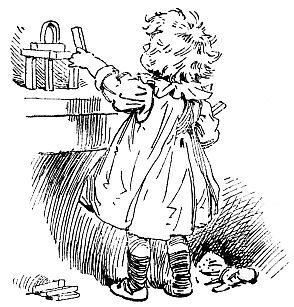
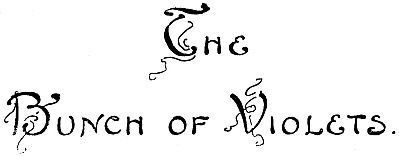
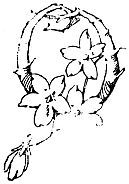
ONCE upon a time there was a little girl named Nettie, who lived with an Aunt and cousin. She was very unhappy, for her naughty cousin used to tell falsehoods about her, which the Aunt believed. Poor Nettie was constantly being punished for faults which she had not committed, but she was so patient and obedient that her Aunt’s heart was touched at last. “Nettie does everything that I tell her,” said the woman to her daughter; “I do not think that she can be such a very bad girl, after all.”
“I know of something she could not do,” said Nettie’s spiteful cousin; “only let me try her!”
“Well, just this once you may,” replied the girl’s Mother; “but if she does not fail, I shall not allow you to tease or worry her again.”[115]
Then they called Nettie, and told her that she must go into the wood and gather a bunch of violets. In spring-time, this would have been an easy task, but it was now mid-winter. Poor Nettie, in a miserably thin frock, wandered forth, shivering and crying. She knew that she should find no violets in such weather, yet she dared not return without them. What was she to do?
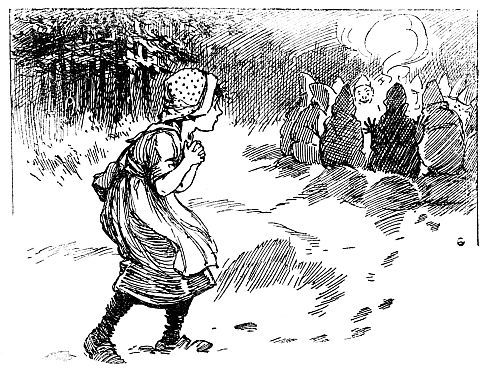
Presently she saw in the distance a bright gleam as of flame. “What can that be?” said Nettie to herself; “I will go and see.” So she went in the direction of the light, and came soon to a fire, around which[116] were twelve men, each seated upon a big stone. The oldest of these men—a very old fellow indeed, whose white beard swept the ground—spoke kindly to the little girl, asking her who she was and what she wanted. Nettie told her sad story. All the men felt very sorry for her, and the oldest one said: “My name is January. You cannot find violets in my month. Yet I think I can find a way to help you.” Then he turned to one of his brothers, and said to him: “Suppose you change places with me, Brother March?”
Brother March jumped up at once, and changed places with his eldest brother. As soon as he had done this, a wonderful change took place in everything. The snow vanished, the sun shone, the air grew softer, the trees began to bud. Nettie forgot her troubles as she saw a bird alight on the grass at her feet, and close to the spot was a bed of the loveliest violets she had ever seen.
She thanked the kind brothers and returned to her Aunt’s house. The violets must surely have been magic flowers, as from that day Nettie was well and kindly treated by her Aunt, and even her cousin ceased to torment her.
E. Dyke.
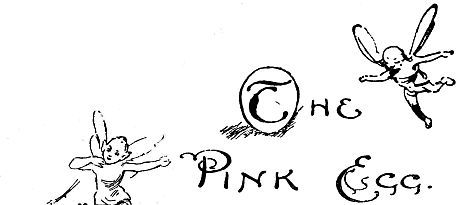



THERE were two robins in the orchard hedge last Spring. They had a dear little nest, and two bluey eggs, and they were as happy as anyone need wish to be.
But one day a Boy came by, and he went off with the two eggs in a pill-box. Then the little robins sat and cried all night.
But when they looked into the nest in the morning they saw where the two bluey eggs had been a small pink egg—the colour of apple-blossoms.
“I shall hatch this egg,” said Mrs. Robin firmly. “Poor little deserted thing!”
“Take care it doesn’t turn out a cuckoo,” said her husband.
But when the orchard was all pink and white with blossom, the egg was hatched,[118] and out of it came no cuckoo but a real live Fairy in a pink gown.
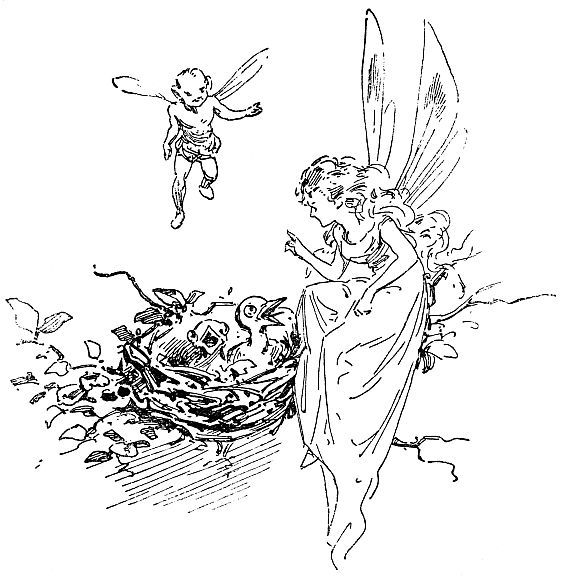
She kissed the Robins again and again. “You dears!” she said. “A wicked enchanter shut me up in that pink egg—and you know the only way to get anything alive[119] out of an egg is to hatch it! So you’ve saved me. And—well, you’ll see.” And she shook out her gauzy wings and fluttered off.
Suddenly the Robins heard a faint “Tweet, tweet.” Mrs. Robin flew to the nest, and there were two baby robins, and the Pink Fairy was sitting on the edge of the nest. And hundreds of pink apple-blossom fairies were crowding round.
“They are your very own babies,” said the Pink Fairy. “While you were hatching me, my brothers and sisters stole your eggs from the Boy, and they’ve been hatched in Fairyland.”
And that’s why two of the robins in our orchard sing more sweetly than any other robins in the world.
They were hatched in Fairyland, you know, and of course that makes all the difference.
E. Nesbit.
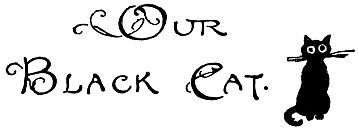
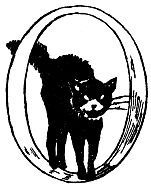
ONCE upon a time there were three little kittens who set out to seek their fortunes. The first kitten found a big barn. “Ah,” he said, “this is a good enough fortune for me.” And he stayed there, and the rats and the mice who lived in the barn were very much annoyed. And the second kitten walked in at the dairy door, and the dairymaid said: “You pretty tabby thing, you shall stay with me.”
“That’s good enough fortune,” said the kitten, and he lives on cream to this day, and he is so fat that he is quite round.
But our black cat (who was the third kitten) was more adventurous. He was running after a young sparrow, and not looking where he was going, so he fell[121] plump into a well, and there would certainly have been an end of him, but that a good-sized Fairy, who lived in that well, and happened to want a cat, pulled him out of the water, and helped him to scramble up on to a ledge in the well-side.
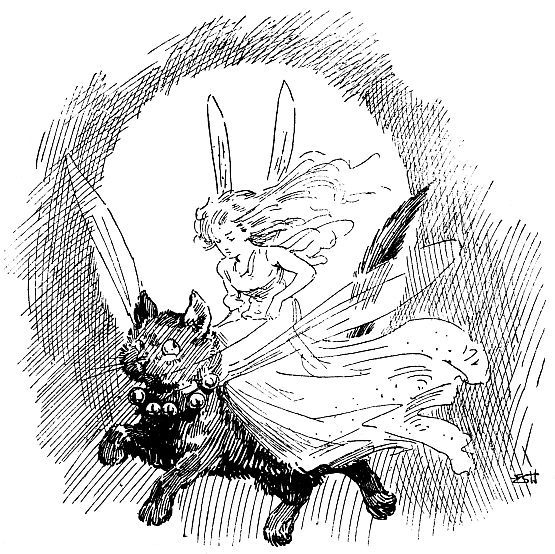
“Now,” said he, “will you be my horse and let me ride on you on fine nights?”
“Yes,” mewed the kitten, shivering; “if I must, I must.”
Then the Fairy opened her front door, which was in the side of the well, and took the wet kitten into her palace, where there was a blazing fairy fire. Fairy servants came and dried the kitten, and gave him warm milk to drink.
“Ah,” said the kitten, “you are something like a Fairy. I will be your horse with pleasure.”
“That’s better,” said the Fairy. “The willing horse does the most work, but he gets the most pay too. You shall never be cold, or hungry, or frightened again.”
And she sent the kitten home at once by fairy telegraph.
That’s why our black cat sleeps all day. He has to go out all night for the Fairy to ride him. He seems just like an ordinary cat: to look at him, you’d never think he was the Fairy’s horse. But he is.
E. Nesbit.

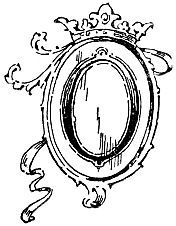
ONCE upon a time there was a good and beautiful Princess, who had heard that “Truth” was at the bottom of a well; so she went to look for it.
Of course, she did not know which well, and before she found the right one she had got quite tired of being let down in buckets by long ropes.
But at last she came to a well in the darkest part of a pine wood, and her heart told her that here her search would end. So she looked down, and saw the bright circle of shining water far, far below.
“But how am I to get down?” she said.
And just then the son of the wood-reeve came by.
“Shall I go down for you, pretty lady?” he asked.
“I must go myself,” she answered. “My fairy goodmother said so.”
So she got into the bucket and he lowered her very carefully. And when she got down she found that the shining circle she had seen was not water but a mirror, and on its frame was written one word—“Truth.”
She came up with the mirror held fast in her arms, and she thanked the wood-reeve’s son and went home.
Now, when in due time came suitors for her hand, the Princess said to each: “How do you like my mirror?” And one after the other they looked in the mirror, and then fled with shrieks of fear.
The King and Queen looked in the mirror and beheld only their good and noble faces.
“What frightens the Princes, your suitors?” they asked.
Then the Princess told them that this was the Mirror of Truth, and that those who looked in it saw their own true natures.
“The Princes, my suitors, had wicked hearts,” she said, “and when they saw their true selves they were afraid.”
And no good Prince came there to woo, so the years went on and the Princess was still unwed.[125]
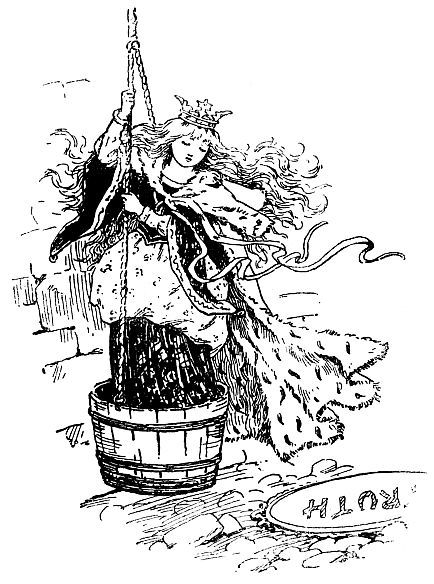
One day, walking in the forest, the Princess met once again the wood-reeve’s son, but he was grown a man, and as soon as the Princess saw him she loved him. She ran and brought her mirror.[126] “Are you afraid to look in it?” she said. “It is the Mirror of Truth.”
“Why should I be afraid?” he asked. And he looked in the mirror, and the Princess, leaning over his shoulder, looked too.
He started back with a cry. “I am not like that,” he said. For the mirror had shown him a face like his own but a thousand times more beautiful, for it revealed now the full glory of his noble nature. And as the Princess looked in the mirror she read his inmost heart.
“Why, you love me,” she said softly.
“I have loved you ever since I first saw you,” he said.
And when the King and Queen saw his face reflected in the mirror they said: “Take our daughter, for you alone are worthy of her.”
So they were married, and the wood-reeve’s son is King of all the land.
E. Nesbit.

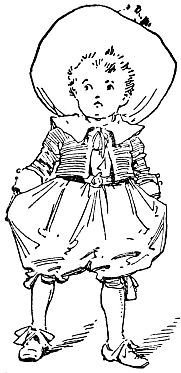
THERE were once some people who went away to the seaside, and shut up their house and sent away all the servants, and then left the poor flowers in their green-house to die of thirst. The fairies were very sorry for the poor pretty things.
“Can’t we help them?” they said, and they flew round the green-house, looking at the flowers through the glass, till at last they found a broken pane in the door. Then the fairies each got a dew-drop and flew in with it, but the poor flowers were so thirsty that the dew-drops were of no use to them.
“Oh, dear!” the fairies said, “however can we help them?”
They talked and talked, but could think[128] of no way. But the most beautiful of the fairies, who was also the wisest, flew away.
“How unfeeling she is!” said the others.
Next day the flowers in the green-house drooped more and more, and they were just murmuring “Water” almost with their last breath, when the little boy from next door climbed over the wall. He looked through the glass at the flowers, and then went in and watered them. And this he did every day.
“I wonder what made him think of it,” said all the fairies.
“Why, I did, of course,” said the wisest and most beautiful. “While you were all chattering I went and sat on his pillow, and whispered to him all about the poor flowers next door. He thought it was a dream, but we and the flowers know better.”
So when the people of the house came back from the seaside they found all their flowers alive and well, and this was certainly very much more than they had any right to expect. And the master of the house was so pleased with the kind care the little boy next door had taken of the flowers that he gave them all to him, and got some new ones for himself.
E. Nesbit.
Printed in Bavaria.
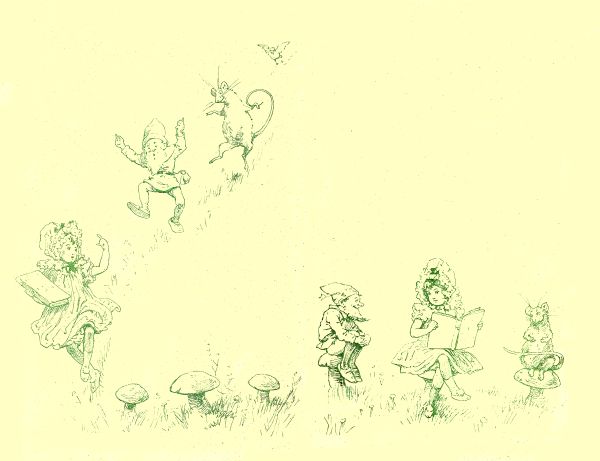
Obvious punctuation errors repaired.
Page 59, “I” changed to “It” (It was a thin)
Page 82, “bnt” changed to “but” (but I couldn’t bear)
End of the Project Gutenberg EBook of My Short Story Book, by Various
*** END OF THIS PROJECT GUTENBERG EBOOK MY SHORT STORY BOOK ***
***** This file should be named 50613-h.htm or 50613-h.zip *****
This and all associated files of various formats will be found in:
http://www.gutenberg.org/5/0/6/1/50613/
Produced by Juliet Sutherland, Emmy and the Online
Distributed Proofreading Team at http://www.pgdp.net
Updated editions will replace the previous one--the old editions will
be renamed.
Creating the works from print editions not protected by U.S. copyright
law means that no one owns a United States copyright in these works,
so the Foundation (and you!) can copy and distribute it in the United
States without permission and without paying copyright
royalties. Special rules, set forth in the General Terms of Use part
of this license, apply to copying and distributing Project
Gutenberg-tm electronic works to protect the PROJECT GUTENBERG-tm
concept and trademark. Project Gutenberg is a registered trademark,
and may not be used if you charge for the eBooks, unless you receive
specific permission. If you do not charge anything for copies of this
eBook, complying with the rules is very easy. You may use this eBook
for nearly any purpose such as creation of derivative works, reports,
performances and research. They may be modified and printed and given
away--you may do practically ANYTHING in the United States with eBooks
not protected by U.S. copyright law. Redistribution is subject to the
trademark license, especially commercial redistribution.
START: FULL LICENSE
THE FULL PROJECT GUTENBERG LICENSE
PLEASE READ THIS BEFORE YOU DISTRIBUTE OR USE THIS WORK
To protect the Project Gutenberg-tm mission of promoting the free
distribution of electronic works, by using or distributing this work
(or any other work associated in any way with the phrase "Project
Gutenberg"), you agree to comply with all the terms of the Full
Project Gutenberg-tm License available with this file or online at
www.gutenberg.org/license.
Section 1. General Terms of Use and Redistributing Project
Gutenberg-tm electronic works
1.A. By reading or using any part of this Project Gutenberg-tm
electronic work, you indicate that you have read, understand, agree to
and accept all the terms of this license and intellectual property
(trademark/copyright) agreement. If you do not agree to abide by all
the terms of this agreement, you must cease using and return or
destroy all copies of Project Gutenberg-tm electronic works in your
possession. If you paid a fee for obtaining a copy of or access to a
Project Gutenberg-tm electronic work and you do not agree to be bound
by the terms of this agreement, you may obtain a refund from the
person or entity to whom you paid the fee as set forth in paragraph
1.E.8.
1.B. "Project Gutenberg" is a registered trademark. It may only be
used on or associated in any way with an electronic work by people who
agree to be bound by the terms of this agreement. There are a few
things that you can do with most Project Gutenberg-tm electronic works
even without complying with the full terms of this agreement. See
paragraph 1.C below. There are a lot of things you can do with Project
Gutenberg-tm electronic works if you follow the terms of this
agreement and help preserve free future access to Project Gutenberg-tm
electronic works. See paragraph 1.E below.
1.C. The Project Gutenberg Literary Archive Foundation ("the
Foundation" or PGLAF), owns a compilation copyright in the collection
of Project Gutenberg-tm electronic works. Nearly all the individual
works in the collection are in the public domain in the United
States. If an individual work is unprotected by copyright law in the
United States and you are located in the United States, we do not
claim a right to prevent you from copying, distributing, performing,
displaying or creating derivative works based on the work as long as
all references to Project Gutenberg are removed. Of course, we hope
that you will support the Project Gutenberg-tm mission of promoting
free access to electronic works by freely sharing Project Gutenberg-tm
works in compliance with the terms of this agreement for keeping the
Project Gutenberg-tm name associated with the work. You can easily
comply with the terms of this agreement by keeping this work in the
same format with its attached full Project Gutenberg-tm License when
you share it without charge with others.
1.D. The copyright laws of the place where you are located also govern
what you can do with this work. Copyright laws in most countries are
in a constant state of change. If you are outside the United States,
check the laws of your country in addition to the terms of this
agreement before downloading, copying, displaying, performing,
distributing or creating derivative works based on this work or any
other Project Gutenberg-tm work. The Foundation makes no
representations concerning the copyright status of any work in any
country outside the United States.
1.E. Unless you have removed all references to Project Gutenberg:
1.E.1. The following sentence, with active links to, or other
immediate access to, the full Project Gutenberg-tm License must appear
prominently whenever any copy of a Project Gutenberg-tm work (any work
on which the phrase "Project Gutenberg" appears, or with which the
phrase "Project Gutenberg" is associated) is accessed, displayed,
performed, viewed, copied or distributed:
This eBook is for the use of anyone anywhere in the United States and
most other parts of the world at no cost and with almost no
restrictions whatsoever. You may copy it, give it away or re-use it
under the terms of the Project Gutenberg License included with this
eBook or online at www.gutenberg.org. If you are not located in the
United States, you'll have to check the laws of the country where you
are located before using this ebook.
1.E.2. If an individual Project Gutenberg-tm electronic work is
derived from texts not protected by U.S. copyright law (does not
contain a notice indicating that it is posted with permission of the
copyright holder), the work can be copied and distributed to anyone in
the United States without paying any fees or charges. If you are
redistributing or providing access to a work with the phrase "Project
Gutenberg" associated with or appearing on the work, you must comply
either with the requirements of paragraphs 1.E.1 through 1.E.7 or
obtain permission for the use of the work and the Project Gutenberg-tm
trademark as set forth in paragraphs 1.E.8 or 1.E.9.
1.E.3. If an individual Project Gutenberg-tm electronic work is posted
with the permission of the copyright holder, your use and distribution
must comply with both paragraphs 1.E.1 through 1.E.7 and any
additional terms imposed by the copyright holder. Additional terms
will be linked to the Project Gutenberg-tm License for all works
posted with the permission of the copyright holder found at the
beginning of this work.
1.E.4. Do not unlink or detach or remove the full Project Gutenberg-tm
License terms from this work, or any files containing a part of this
work or any other work associated with Project Gutenberg-tm.
1.E.5. Do not copy, display, perform, distribute or redistribute this
electronic work, or any part of this electronic work, without
prominently displaying the sentence set forth in paragraph 1.E.1 with
active links or immediate access to the full terms of the Project
Gutenberg-tm License.
1.E.6. You may convert to and distribute this work in any binary,
compressed, marked up, nonproprietary or proprietary form, including
any word processing or hypertext form. However, if you provide access
to or distribute copies of a Project Gutenberg-tm work in a format
other than "Plain Vanilla ASCII" or other format used in the official
version posted on the official Project Gutenberg-tm web site
(www.gutenberg.org), you must, at no additional cost, fee or expense
to the user, provide a copy, a means of exporting a copy, or a means
of obtaining a copy upon request, of the work in its original "Plain
Vanilla ASCII" or other form. Any alternate format must include the
full Project Gutenberg-tm License as specified in paragraph 1.E.1.
1.E.7. Do not charge a fee for access to, viewing, displaying,
performing, copying or distributing any Project Gutenberg-tm works
unless you comply with paragraph 1.E.8 or 1.E.9.
1.E.8. You may charge a reasonable fee for copies of or providing
access to or distributing Project Gutenberg-tm electronic works
provided that
* You pay a royalty fee of 20% of the gross profits you derive from
the use of Project Gutenberg-tm works calculated using the method
you already use to calculate your applicable taxes. The fee is owed
to the owner of the Project Gutenberg-tm trademark, but he has
agreed to donate royalties under this paragraph to the Project
Gutenberg Literary Archive Foundation. Royalty payments must be paid
within 60 days following each date on which you prepare (or are
legally required to prepare) your periodic tax returns. Royalty
payments should be clearly marked as such and sent to the Project
Gutenberg Literary Archive Foundation at the address specified in
Section 4, "Information about donations to the Project Gutenberg
Literary Archive Foundation."
* You provide a full refund of any money paid by a user who notifies
you in writing (or by e-mail) within 30 days of receipt that s/he
does not agree to the terms of the full Project Gutenberg-tm
License. You must require such a user to return or destroy all
copies of the works possessed in a physical medium and discontinue
all use of and all access to other copies of Project Gutenberg-tm
works.
* You provide, in accordance with paragraph 1.F.3, a full refund of
any money paid for a work or a replacement copy, if a defect in the
electronic work is discovered and reported to you within 90 days of
receipt of the work.
* You comply with all other terms of this agreement for free
distribution of Project Gutenberg-tm works.
1.E.9. If you wish to charge a fee or distribute a Project
Gutenberg-tm electronic work or group of works on different terms than
are set forth in this agreement, you must obtain permission in writing
from both the Project Gutenberg Literary Archive Foundation and The
Project Gutenberg Trademark LLC, the owner of the Project Gutenberg-tm
trademark. Contact the Foundation as set forth in Section 3 below.
1.F.
1.F.1. Project Gutenberg volunteers and employees expend considerable
effort to identify, do copyright research on, transcribe and proofread
works not protected by U.S. copyright law in creating the Project
Gutenberg-tm collection. Despite these efforts, Project Gutenberg-tm
electronic works, and the medium on which they may be stored, may
contain "Defects," such as, but not limited to, incomplete, inaccurate
or corrupt data, transcription errors, a copyright or other
intellectual property infringement, a defective or damaged disk or
other medium, a computer virus, or computer codes that damage or
cannot be read by your equipment.
1.F.2. LIMITED WARRANTY, DISCLAIMER OF DAMAGES - Except for the "Right
of Replacement or Refund" described in paragraph 1.F.3, the Project
Gutenberg Literary Archive Foundation, the owner of the Project
Gutenberg-tm trademark, and any other party distributing a Project
Gutenberg-tm electronic work under this agreement, disclaim all
liability to you for damages, costs and expenses, including legal
fees. YOU AGREE THAT YOU HAVE NO REMEDIES FOR NEGLIGENCE, STRICT
LIABILITY, BREACH OF WARRANTY OR BREACH OF CONTRACT EXCEPT THOSE
PROVIDED IN PARAGRAPH 1.F.3. YOU AGREE THAT THE FOUNDATION, THE
TRADEMARK OWNER, AND ANY DISTRIBUTOR UNDER THIS AGREEMENT WILL NOT BE
LIABLE TO YOU FOR ACTUAL, DIRECT, INDIRECT, CONSEQUENTIAL, PUNITIVE OR
INCIDENTAL DAMAGES EVEN IF YOU GIVE NOTICE OF THE POSSIBILITY OF SUCH
DAMAGE.
1.F.3. LIMITED RIGHT OF REPLACEMENT OR REFUND - If you discover a
defect in this electronic work within 90 days of receiving it, you can
receive a refund of the money (if any) you paid for it by sending a
written explanation to the person you received the work from. If you
received the work on a physical medium, you must return the medium
with your written explanation. The person or entity that provided you
with the defective work may elect to provide a replacement copy in
lieu of a refund. If you received the work electronically, the person
or entity providing it to you may choose to give you a second
opportunity to receive the work electronically in lieu of a refund. If
the second copy is also defective, you may demand a refund in writing
without further opportunities to fix the problem.
1.F.4. Except for the limited right of replacement or refund set forth
in paragraph 1.F.3, this work is provided to you 'AS-IS', WITH NO
OTHER WARRANTIES OF ANY KIND, EXPRESS OR IMPLIED, INCLUDING BUT NOT
LIMITED TO WARRANTIES OF MERCHANTABILITY OR FITNESS FOR ANY PURPOSE.
1.F.5. Some states do not allow disclaimers of certain implied
warranties or the exclusion or limitation of certain types of
damages. If any disclaimer or limitation set forth in this agreement
violates the law of the state applicable to this agreement, the
agreement shall be interpreted to make the maximum disclaimer or
limitation permitted by the applicable state law. The invalidity or
unenforceability of any provision of this agreement shall not void the
remaining provisions.
1.F.6. INDEMNITY - You agree to indemnify and hold the Foundation, the
trademark owner, any agent or employee of the Foundation, anyone
providing copies of Project Gutenberg-tm electronic works in
accordance with this agreement, and any volunteers associated with the
production, promotion and distribution of Project Gutenberg-tm
electronic works, harmless from all liability, costs and expenses,
including legal fees, that arise directly or indirectly from any of
the following which you do or cause to occur: (a) distribution of this
or any Project Gutenberg-tm work, (b) alteration, modification, or
additions or deletions to any Project Gutenberg-tm work, and (c) any
Defect you cause.
Section 2. Information about the Mission of Project Gutenberg-tm
Project Gutenberg-tm is synonymous with the free distribution of
electronic works in formats readable by the widest variety of
computers including obsolete, old, middle-aged and new computers. It
exists because of the efforts of hundreds of volunteers and donations
from people in all walks of life.
Volunteers and financial support to provide volunteers with the
assistance they need are critical to reaching Project Gutenberg-tm's
goals and ensuring that the Project Gutenberg-tm collection will
remain freely available for generations to come. In 2001, the Project
Gutenberg Literary Archive Foundation was created to provide a secure
and permanent future for Project Gutenberg-tm and future
generations. To learn more about the Project Gutenberg Literary
Archive Foundation and how your efforts and donations can help, see
Sections 3 and 4 and the Foundation information page at
www.gutenberg.org
Section 3. Information about the Project Gutenberg Literary Archive Foundation
The Project Gutenberg Literary Archive Foundation is a non profit
501(c)(3) educational corporation organized under the laws of the
state of Mississippi and granted tax exempt status by the Internal
Revenue Service. The Foundation's EIN or federal tax identification
number is 64-6221541. Contributions to the Project Gutenberg Literary
Archive Foundation are tax deductible to the full extent permitted by
U.S. federal laws and your state's laws.
The Foundation's principal office is in Fairbanks, Alaska, with the
mailing address: PO Box 750175, Fairbanks, AK 99775, but its
volunteers and employees are scattered throughout numerous
locations. Its business office is located at 809 North 1500 West, Salt
Lake City, UT 84116, (801) 596-1887. Email contact links and up to
date contact information can be found at the Foundation's web site and
official page at www.gutenberg.org/contact
For additional contact information:
Dr. Gregory B. Newby
Chief Executive and Director
gbnewby@pglaf.org
Section 4. Information about Donations to the Project Gutenberg
Literary Archive Foundation
Project Gutenberg-tm depends upon and cannot survive without wide
spread public support and donations to carry out its mission of
increasing the number of public domain and licensed works that can be
freely distributed in machine readable form accessible by the widest
array of equipment including outdated equipment. Many small donations
($1 to $5,000) are particularly important to maintaining tax exempt
status with the IRS.
The Foundation is committed to complying with the laws regulating
charities and charitable donations in all 50 states of the United
States. Compliance requirements are not uniform and it takes a
considerable effort, much paperwork and many fees to meet and keep up
with these requirements. We do not solicit donations in locations
where we have not received written confirmation of compliance. To SEND
DONATIONS or determine the status of compliance for any particular
state visit www.gutenberg.org/donate
While we cannot and do not solicit contributions from states where we
have not met the solicitation requirements, we know of no prohibition
against accepting unsolicited donations from donors in such states who
approach us with offers to donate.
International donations are gratefully accepted, but we cannot make
any statements concerning tax treatment of donations received from
outside the United States. U.S. laws alone swamp our small staff.
Please check the Project Gutenberg Web pages for current donation
methods and addresses. Donations are accepted in a number of other
ways including checks, online payments and credit card donations. To
donate, please visit: www.gutenberg.org/donate
Section 5. General Information About Project Gutenberg-tm electronic works.
Professor Michael S. Hart was the originator of the Project
Gutenberg-tm concept of a library of electronic works that could be
freely shared with anyone. For forty years, he produced and
distributed Project Gutenberg-tm eBooks with only a loose network of
volunteer support.
Project Gutenberg-tm eBooks are often created from several printed
editions, all of which are confirmed as not protected by copyright in
the U.S. unless a copyright notice is included. Thus, we do not
necessarily keep eBooks in compliance with any particular paper
edition.
Most people start at our Web site which has the main PG search
facility: www.gutenberg.org
This Web site includes information about Project Gutenberg-tm,
including how to make donations to the Project Gutenberg Literary
Archive Foundation, how to help produce our new eBooks, and how to
subscribe to our email newsletter to hear about new eBooks.